CMEPS-J Report No. 61 (May 24, 2022, revised on July 5, 2022)
Ziad ALAHMAD
Hiroyuki AOYAMA
I. Purpose of Survey
The research project, “Syrians in Turkey, a decade and more of cohabitation: Gaziantep, a case study”, aimed at (1) analyzing the relationship between the two communities and the integration possibilities after a decade of living together from two different perspectives, and (2) proposing what contributions and efforts should be made by the policymakers, international institutions, and the non-governmental organizations to foster the harmony and the coexistence, and finding sustainable solutions for the Syrians in Turkey.
II. Method of Survey
1. SURVEY SCHEDULE
-
- December 1 – December 30, 2021: Preparation of a draft of the questionnaire by the researchers.
- January 1 – January 7, 2022: Field team recruitment and finalizing the questionnaire.
- January 8 – January 10, 2022: Field staff training.
- January 11, 2022: Pilot surveys.
- January 12 – February 8, 2022: Data collection.
- February 10 – May 1, 2022: Data cleaning and data analysis.
- May 2 – May 18, 2022: Simple tally report preparation.
2. Survey Subjects
A total of 1,058 individuals 50% of them are Syrian migrants and 50% are Turkish citizens aged between 18 and 75 years and residing in Gaziantep were selected to participate in the survey.
3. Survey Method
Door-to-door individual personal interviews in Arabic with Syrians and in Turkish with Turkish citizens.
4. Sampling Method
According to the announced numbers by the Directorate General of Migration Management (DGMM) in Turkey, 3,762,889 Syrians under temporary protection and 109,275 Syrians with a short-term residence permit are living in Turkey (as of May 5, 2022). Gaziantep was selected in the survey as it is one of the Turkish provinces that host the biggest number of Syrians (462,893 Syrians, as of May 5, 2022 (DGMM)) after Istanbul. The Syrians in Gaziantep make up around 22% of the total population (DGMM), and the vast majority of them live in the Şahinbey district, followed by the Şehitkamil district, which hosts around 20% of the Syrians only, and the rest live in the other six districts (Sandal, Hançerkıran, & Tıraş, 2016).
Accordingly, Şahinbey and Şehitkamil were prioritized, taking into consideration the density of the Syrians in each of them, the busiest 20 neighbourhoods were selected as a research area, and the quota was divided between them equally. The data collectors worked in teams (10 teams in total); each team consisted of an Arabic speaker and a Turkish speaker. In the selected neighbourhoods, 5 streets were selected by using a Kish table, and 10 interviews (50% from the Syrian community and the other half from the host) were completed in each street through a random walk, taking gender and age into consideration.
Survey Areas and Number of Samples
| Neighbourhood | Syrian | Turkish | Grand Total | ||
| Şahinbey | Şehitkamil | Şahinbey | Şehitkamil | ||
| 60. Yıl | 25 | 26 | 51 | ||
| Akyol | 31 | 25 | 56 | ||
| Binevler | 26 | 29 | 55 | ||
| Boyaci | 25 | 25 | 50 | ||
| Cumhuriyet | 26 | 26 | 52 | ||
| Deniz | 25 | 25 | 50 | ||
| Duluk | 25 | 25 | 50 | ||
| Eyüpoğlu | 30 | 25 | 55 | ||
| Güneş | 25 | 26 | 51 | ||
| Güneykent | 25 | 29 | 54 | ||
| Hoşgör | 26 | 25 | 51 | ||
| Karataş | 26 | 27 | 53 | ||
| Kolejtepe | 31 | 31 | 62 | ||
| Konak | 25 | 25 | 50 | ||
| Mevlana | 25 | 25 | 50 | ||
| Mimar Sinan | 25 | 28 | 53 | ||
| Şahintepe | 28 | 29 | 57 | ||
| Selimiye | 25 | 26 | 51 | ||
| Yazicik | 27 | 25 | 52 | ||
| Yeditepe | 28 | 27 | 55 | ||
| Grand Total | 454 | 75 | 453 | 76 | 1058 |
Map
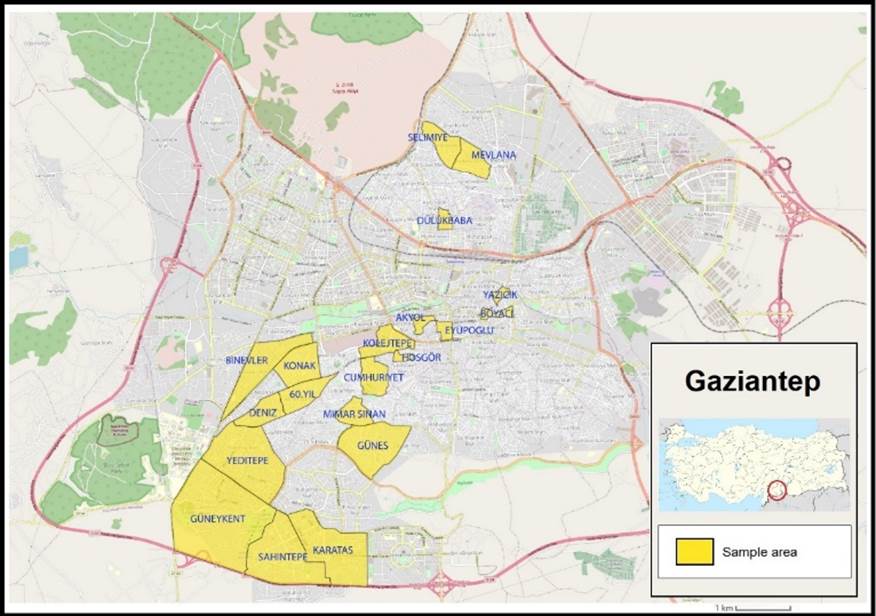
Source: Drawn by Murat Kaya and Ziad Alahmad.
III. Aggregated Results: Turkish Community
Interview Location
L01. District (N=529)
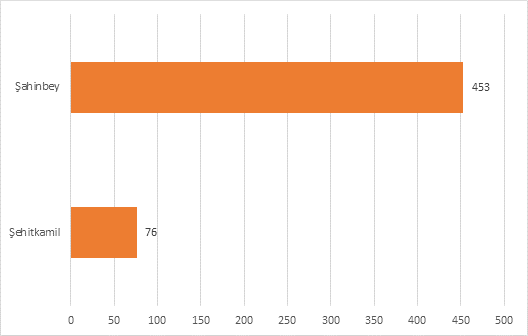
L02. Neighbourhood (N=529)
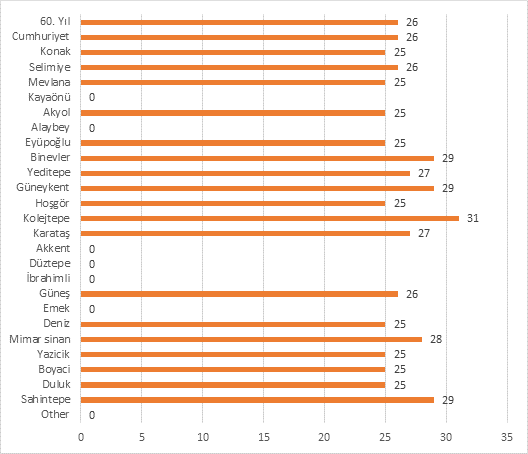
Data of Interviewees
B01. Gender (N=529)
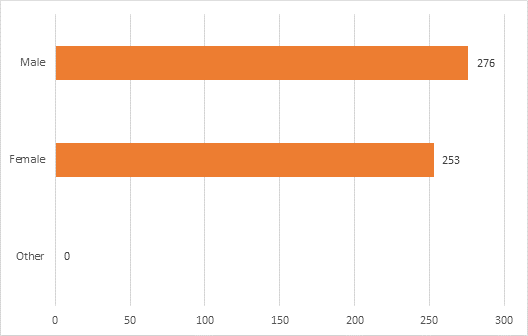
B02. Age (N=529)
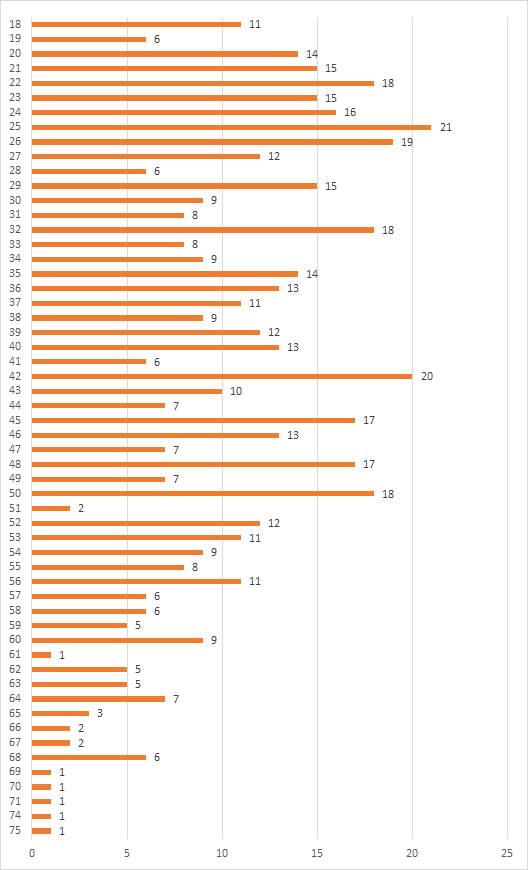
B03. Marital Status (N=529)
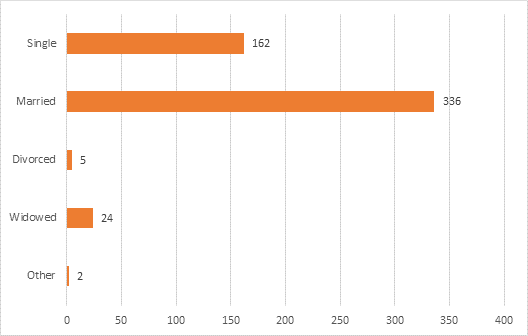
B03-01. If “Married”, “Divorced” or “Widowed” in B03, do you have children? (N=365)
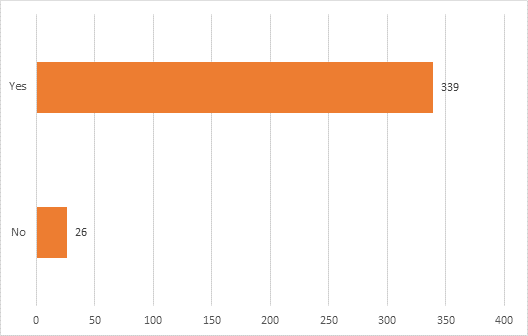
B03-02. If “Yes” in B03-1, how many children do you have? (N=339)
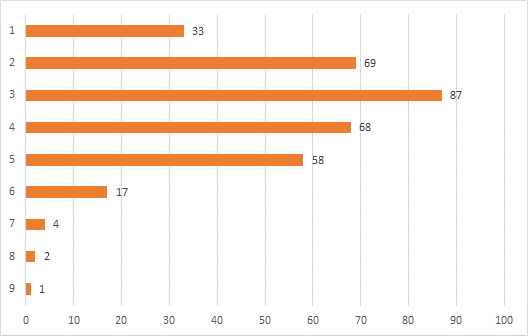
B04. Do you/your wife/children currently study in schools/universities? (N=529)
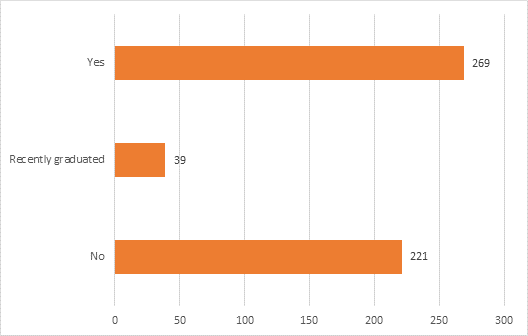
B04-01. If “Married”, “Divorced” or “Widowed” in B03, are you married to a Syrian national? (N=365)

B05. Are any of your family members married to a Syrian national? (N=529)
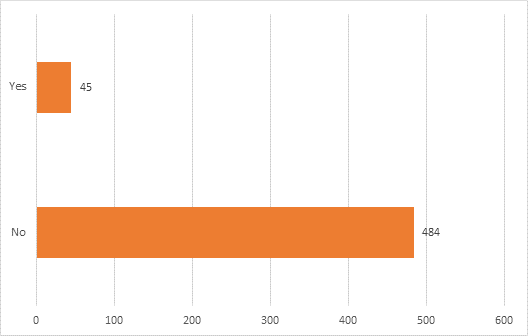
B06. Educational level (N=529)
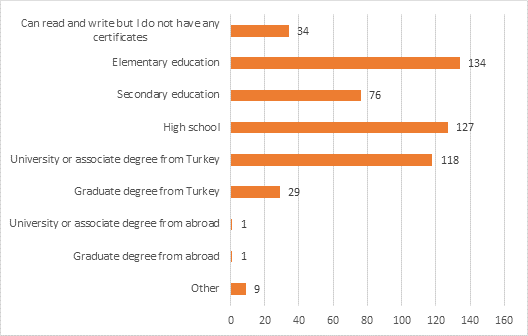
B07. What is your profession? (N=529)
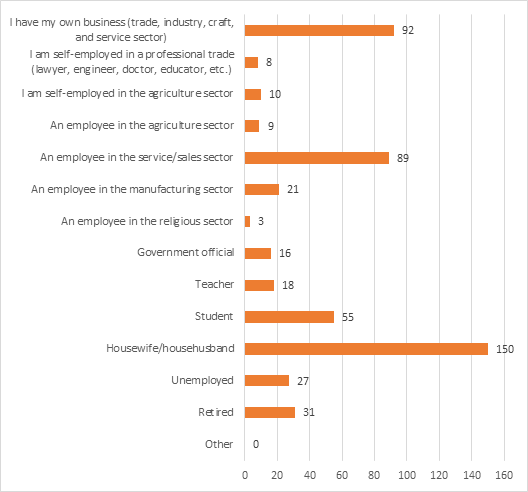
B08. Did you previously live abroad? (N=529)
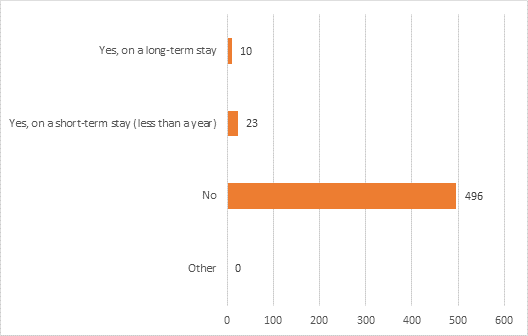
B08-01. If “Yes, on a long-term stay” or “Yes, on a short-term stay (less than one year)” in B08, which country? (N=33)
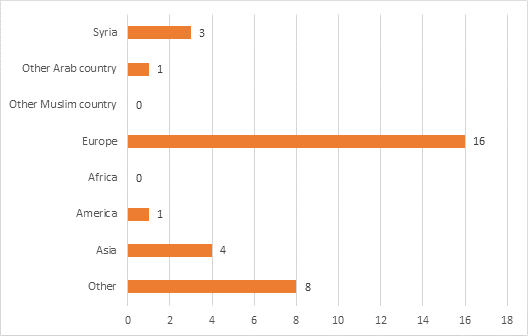
B09. Did you visit Syria before the war? (N=529)
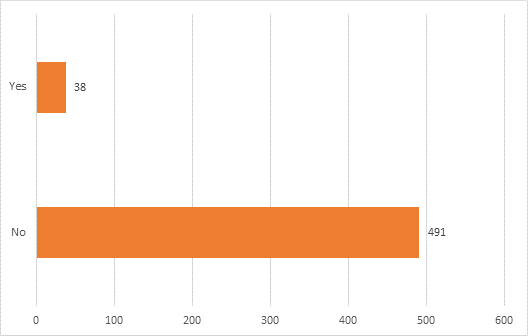
B10. Do you have any relatives who live in Syria? (N=529)
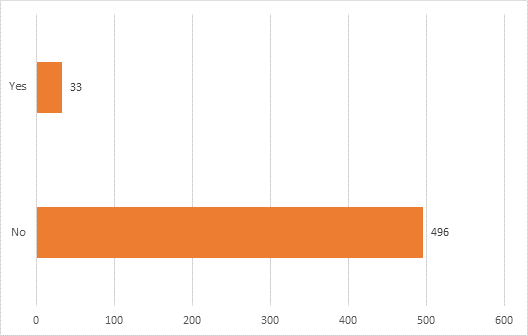
B11. Which languages do you speak? (multiselect) (N=529)
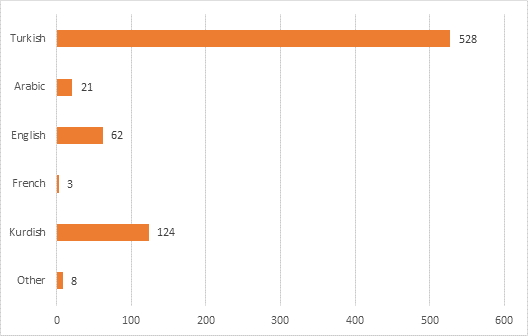
B12. Do you or any of your family members have a chronic disease or a permanent disability? (N=529)
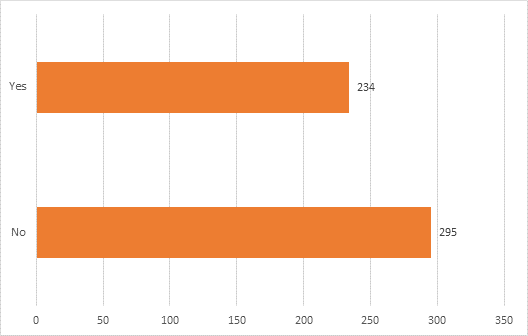
B13. Do you own a car? (N=529)
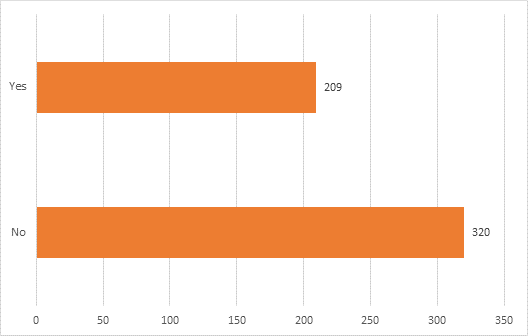
B14. What is your current shelter status? (N=529)
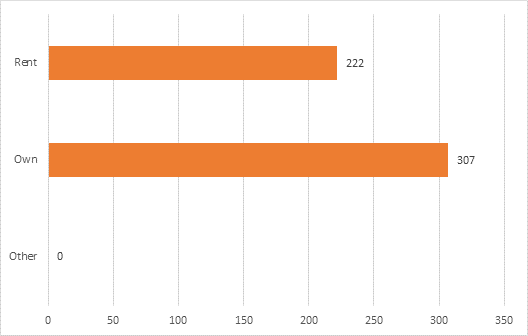
Q01. Local’s perspectives
Q01-01. Do you think Syrians will return to their country in the future? (N=529)
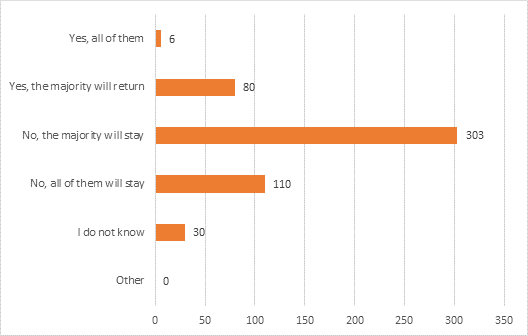
Q01-02. Do you think Syrians became part of the Turkish community? (N=529)
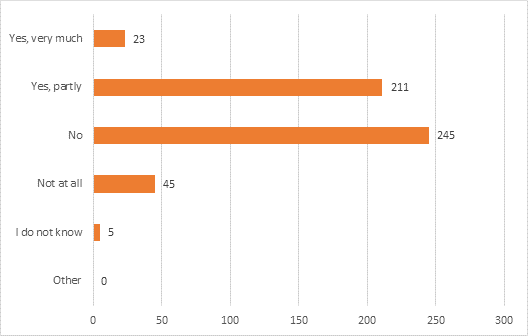
Q01-03. Do you think Syrians are the cause of the economic crisis in Turkey? (N=529)
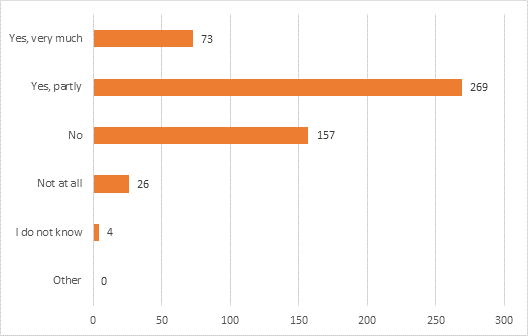
Q01-04. Do you think Syrians cause troubles and threaten the safety of Turkey? (N=529)
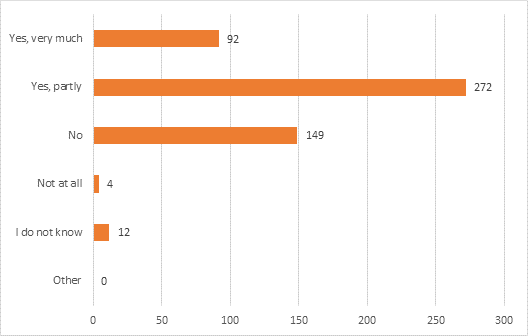
Q01-05. Do you feel agitated when you see Syrians speaking Arabic? (N=529)
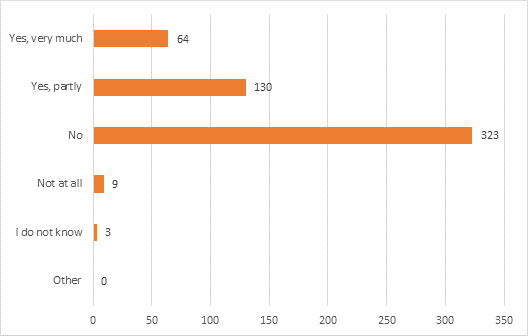
Q01-06. Do you feel agitated when you see signs written in Arabic? (N=529)
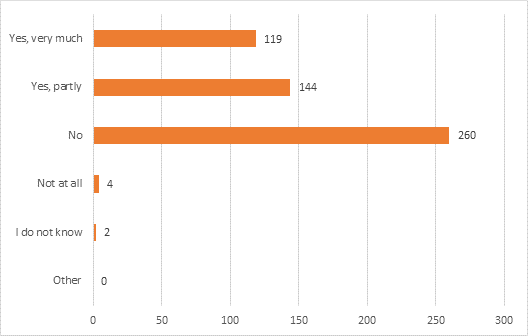
Q01-07. Considering the current situation, do you think Syrians should be sent back to their country? (N=529)
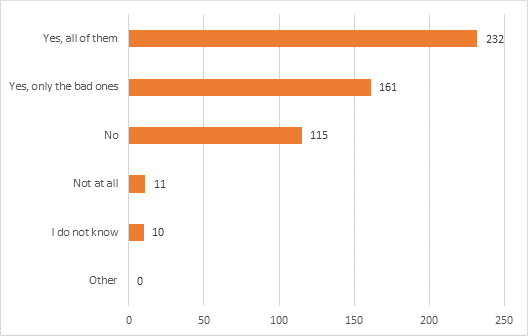
Q01-08. Should Syrians be given Turkish citizenship? (N=529)
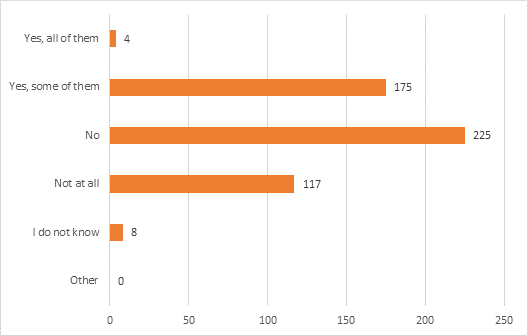
Q01-09. Do you consider Syrians who got the Turkish citizenship a part of the Turkish community? (N=529)
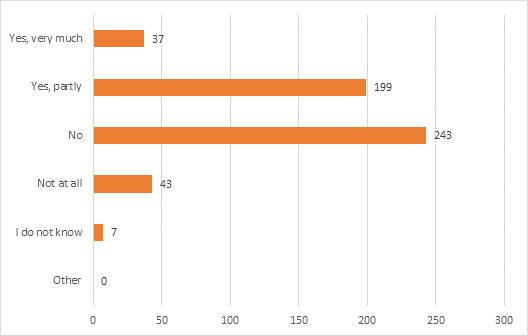
Q01-10. How do you think the Turkish community accepts Syrians compared to last year? (N=529)
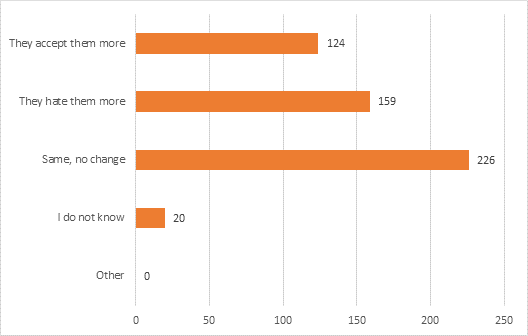
Q01-11. If you have a house, will you consider renting it to a Syrian family? (N=529)

Q01-12. If you own a company, would you accept Syrian workers? (N=529)
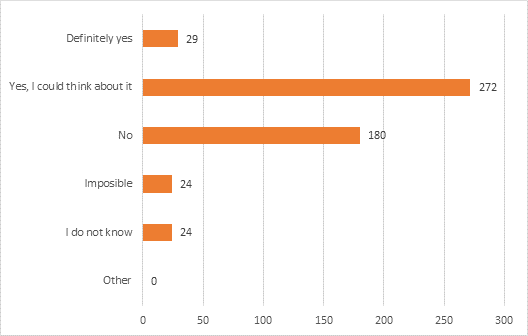
Q02. Language and culture
Q02-01. What do you think about Syrian food? (N=529)
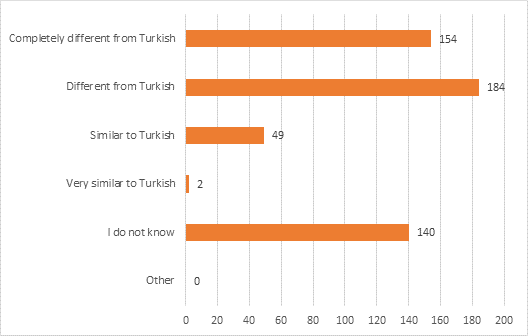
Q02-02. Did you try making Syrian food at home following the Syrians’ arrival? (N=529)
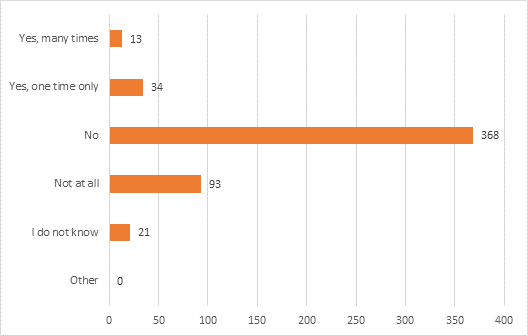
Q02-03. What are your thoughts on Syrians’ dressing style? (N=529)
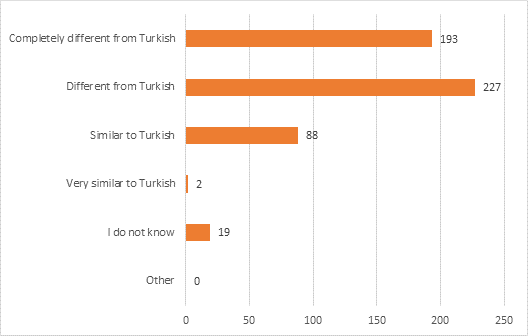
Q02-04. What should Syrians change in their life to become a part of the community? (multiselect) (N=529)
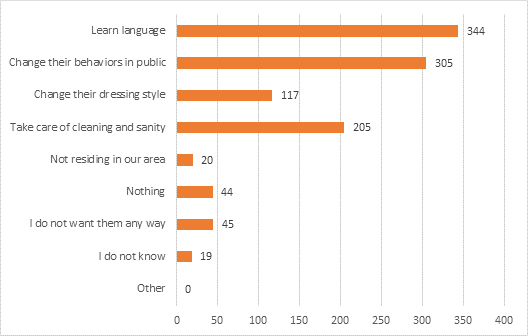
Q02-05. To which extent are you familiar with the Syrian community? (N=529)
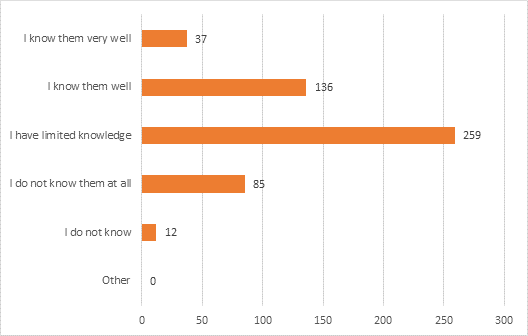
Q02-06. To which extent do you believe Syrians know and understand about the Turkish community? (N=529)

Q02-07. Which one do you think is more welcomed and accepted by the Turkish community? (N=529)
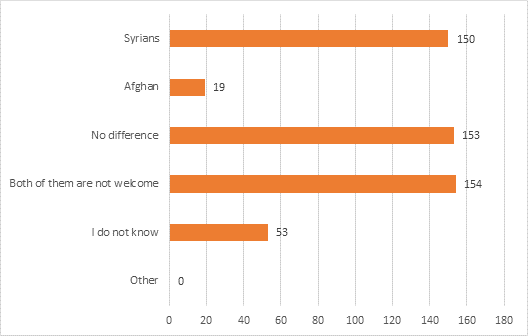
Q02-07-01. If “Syrians” in Q02-07, why? (multiselect) (N=150)
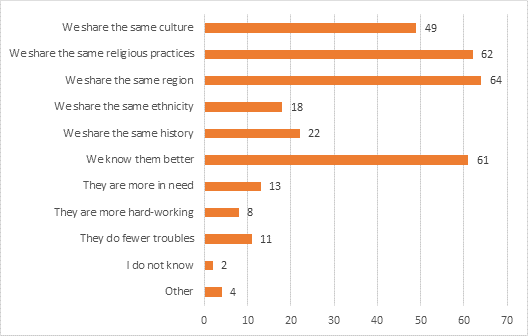
Q02-07-02. If “Afghan” in Q02-07, why? (multiselect) (N=19)
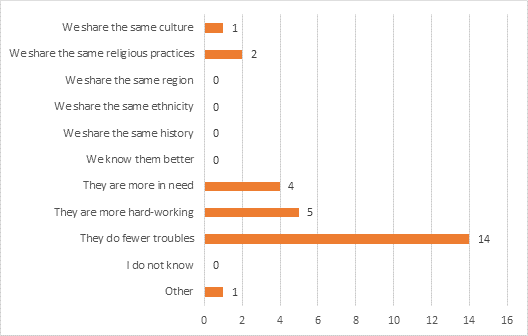
Q03. Communication
Q03-01. How long have you been living in this neighbourhood? (N=529)
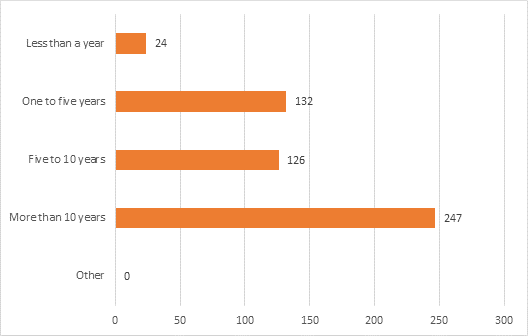
Q03-02. What percentage of the Syrians living in your neighbourhood compared to Turkish? (N=529)

Q03-03. Are there any Syrians living in your building? (N=529)
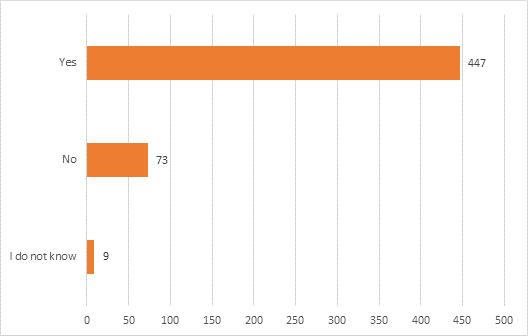
Q03-03-01. If “Yes” in Q03-03, how do you describe your relationship with them? (N=447)
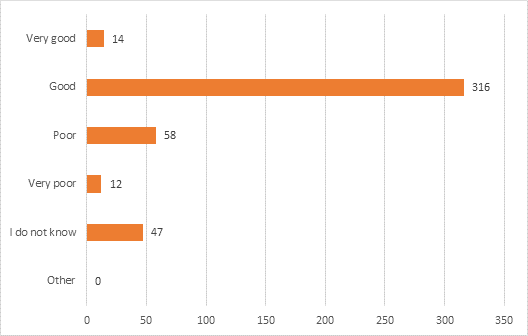
Q03-04. How would you describe your communication with the Syrian community in general? (N=529)
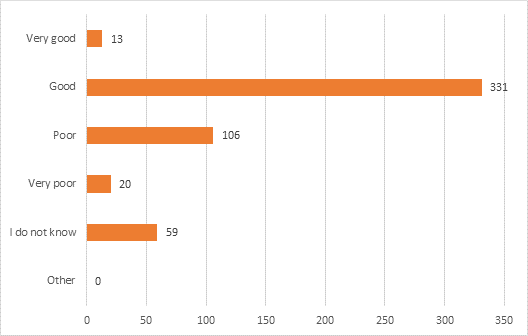
Q03-05. Do you feel agitated when you see the Syrians outside? (N=529)
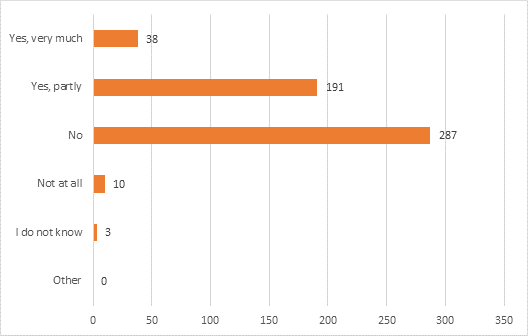
Q03-06. Did you participate in the integration program of the DGMM or other NGO? (N=529)
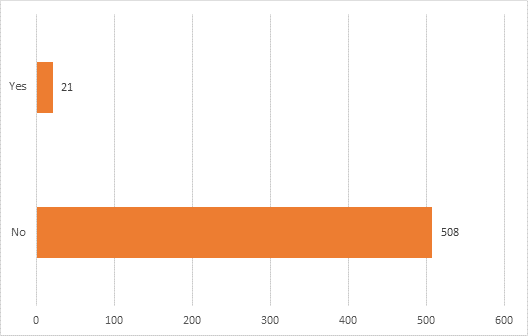
Q03-06-01. If “Yes” in Q03-06, did it have an impact on your daily life and dealing with the Syrian community? (N=21)
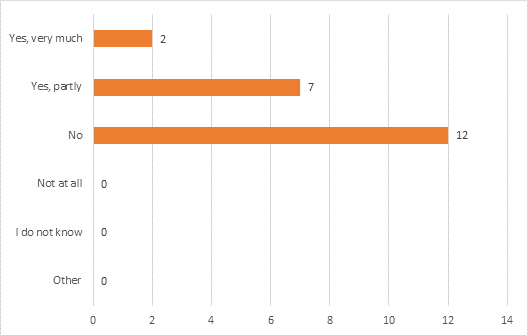
Q03-07. Do your Syrian neighbours greet you when they see you outside? (N=529)
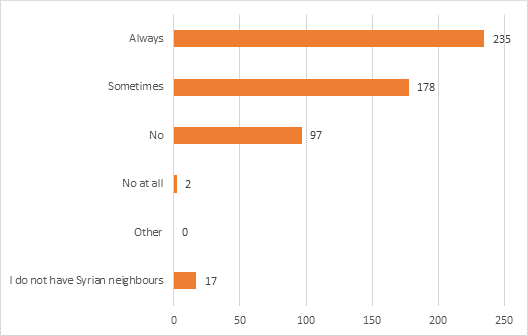
Q03-08. Do you greet your Syrian neighbours when you see them outside? (N=529)
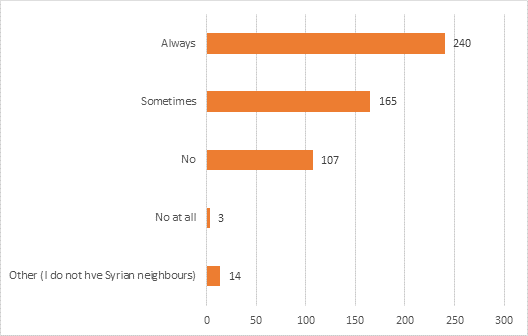
Q03-09. Did you encounter any misunderstandings or problems with the Syrian people around you? (N=529)
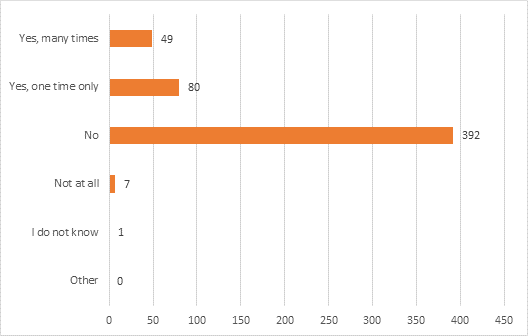
Q03-09-01. If “yes” or “Recently graduated” in B04, do you/your children have Syrian friends in the school/university? (N=308)

Q03-09-02. If “yes” or “Recently graduated” in B04, do you/your children face any discrimination in schools/universities? (N=308)
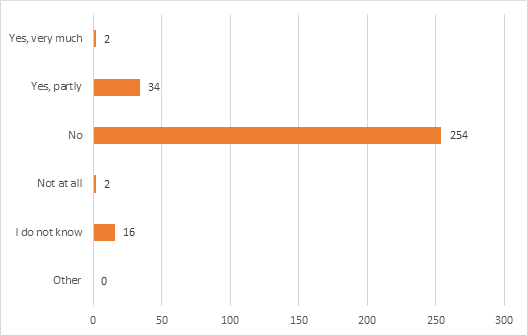
Q03-10. What do you do when a misunderstanding or problem happens with the Syrian people around you? (N=529)
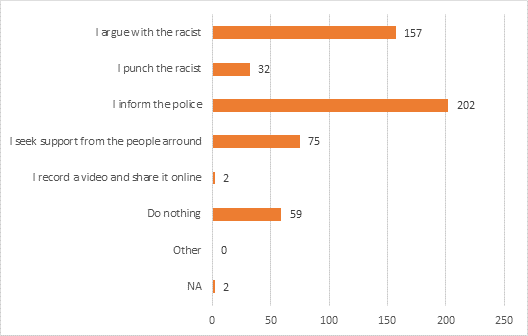
Q03-11. Do you think your area looks different after the Syrians came? (N=529)
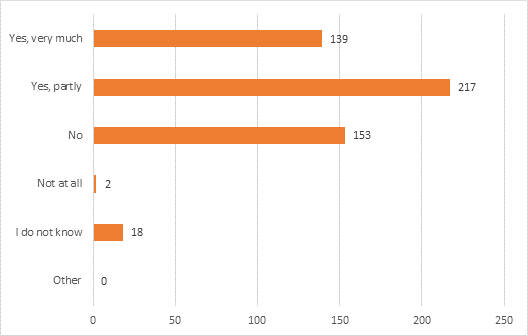
Q03-11-01. If “Yes, very much” or “Yes, partly” in Q03-11, in what sense is it different? (N=356)
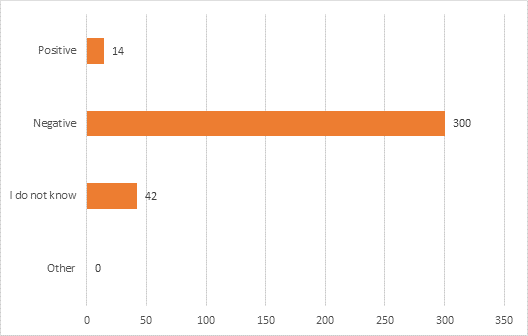
Q03-12. Where do you meet Syrians mainly? (multiselect) (N=529)
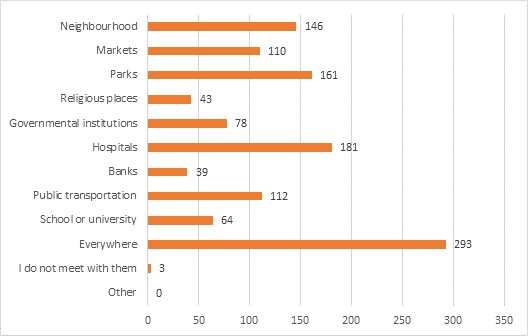
Q03-13. What do you think is the reason for the recent discrimination against Syrians in Turkey? (multiselect) (N=529)
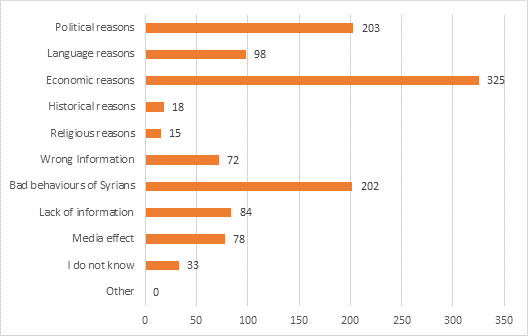
Q03-14. Do you feel agitated when you visit the Governmental institutions and see Syrians there? (N=529)
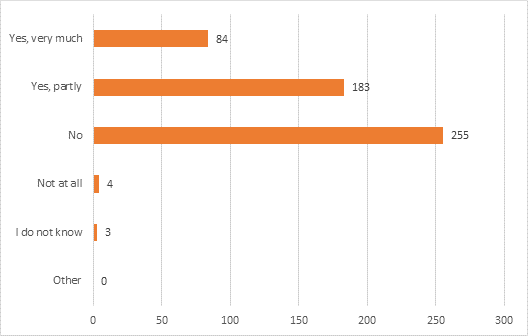
Q03-15. Did they have any problems with Syrian Students recently? (if the answer in B03-02 is “Yes”) (N=529)
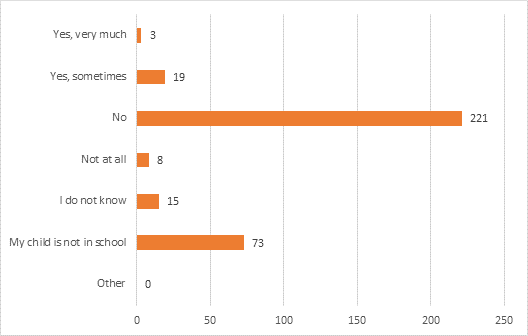
Q03-16. Do you have close Syrian friends? (N=529)
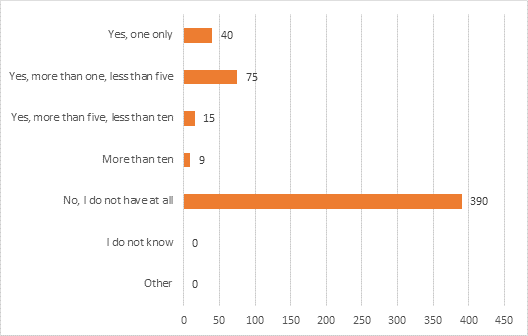
Q03-16-01. If “Yes, one only”, “Yes, more than one, less than five”, “Yes, more than five, less than ten” or “More than ten in Q03-16, where did you meet them? (multiselect) (N=139)
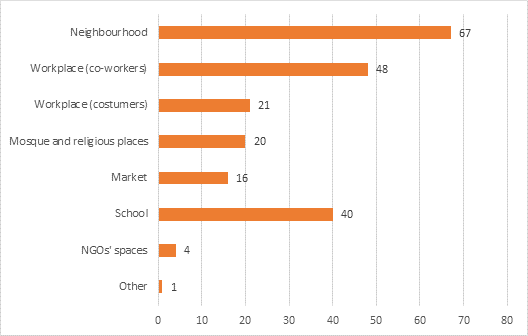
Q03-17. By living the same risk and having the same fears, how did the COVID_19 pandemic affect the relationship between Turkish and Syrian communities? (N=529)
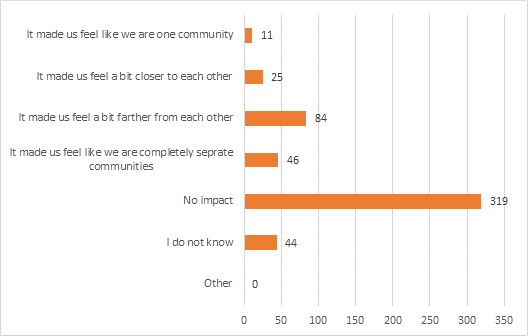
Q03-18. In which field do you think Syrians in Turkey are having difficulty? (multiselect) (N=529)
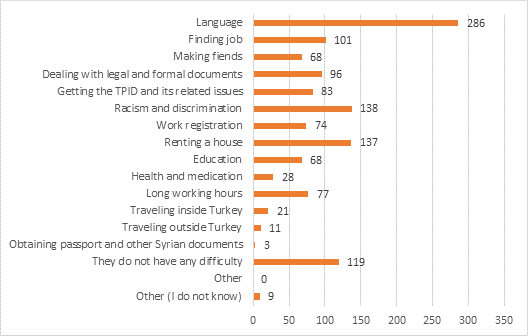
Q04. Economic impact
Q04-01. What do you think about your family’s monthly income in comparison with the average –4253 TL (N=529)
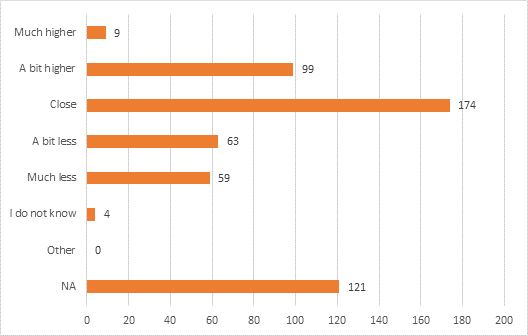
Q04-02. Are you satisfied with your monthly income? (N=529)
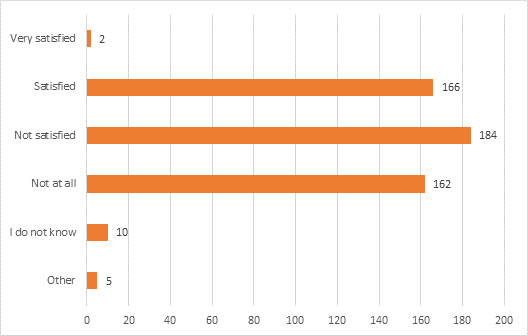
Q04-02-01. Do Syrians have their own professions in this field (the profession selected in B07)? (If the answer in B07 is “I have my own business (trade, industry, craft, and service sector) ”, “I am self-employed in a professional trade (lawyer, engineer, doctor, educator, etc.) ”, “I am self-employed in the agriculture sector”, “An employee in the agriculture sector”, “An employee in the service/sales sector”, “An employee in the manufacturing sector”, “An employee in the religious sector”, “Government official” or “Teacher”) (N=266)
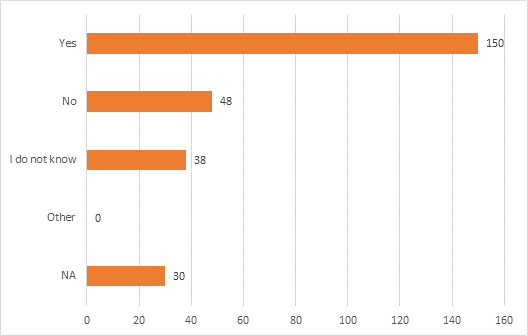
Q04-02-02. Do you think Syrians are affecting your profession? (If the answer in B07 is “I have my own business (trade, industry, craft, and service sector) ”, “I am self-employed in a professional trade (lawyer, engineer, doctor, educator, etc.) ”, “I am self-employed in the agriculture sector”, “An employee in the agriculture sector”, “An employee in the service/sales sector”, “An employee in the manufacturing sector”, “An employee in the religious sector”, “Government official” or “Teacher”) (N=266)
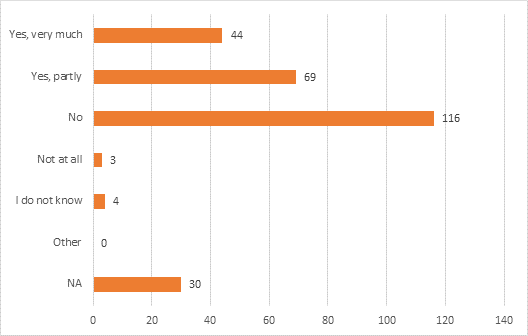
Q04-02-03. Did you have to change your profession after Syrians came? (If the answer in B07 is “I have my own business (trade, industry, craft, and service sector) ”, “I am self-employed in a professional trade (lawyer, engineer, doctor, educator, etc.) ”, “I am self-employed in the agriculture sector”, “An employee in the agriculture sector”, “An employee in the service/sales sector”, “An employee in the manufacturing sector”, “An employee in the religious sector”, “Government official” or “Teacher”) (N=266)
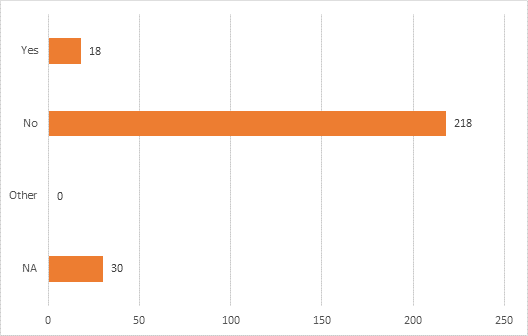
Q04-02-04. Do you have Syrian co-workers at your workplace? (If the answer in B07 is “I have my own business (trade, industry, craft, and service sector) ”, “I am self-employed in a professional trade (lawyer, engineer, doctor, educator, etc.) ”, “I am self-employed in the agriculture sector”, “An employee in the agriculture sector”, “An employee in the service/sales sector”, “An employee in the manufacturing sector”, “An employee in the religious sector”, “Government official” or “Teacher”) (N=266)

Q04-02-04-01. If “Yes” in Q04-02-04, do you meet with them outside of work? (N=66)
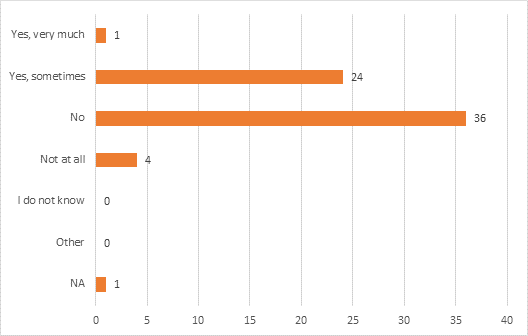
Q04-02-05. If owning a business, in which field is it? (If the answer in B07 is “I have my own business (trade, industry, craft, and service sector)”, “I am self-employed in a professional trade (lawyer, engineer, doctor, educator, etc.)” or “I am self-employed in the agriculture sector”) (N=110)
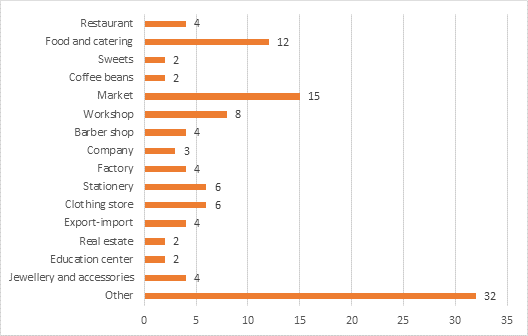
Q04-02-06. If owning a business, do you have Syrian staff? (If the answer in B07 is “I have my own business (trade, industry, craft, and service sector)”, “I am self-employed in a professional trade (lawyer, engineer, doctor, educator, etc.)” or “I am self-employed in the agriculture sector”) (N=110)
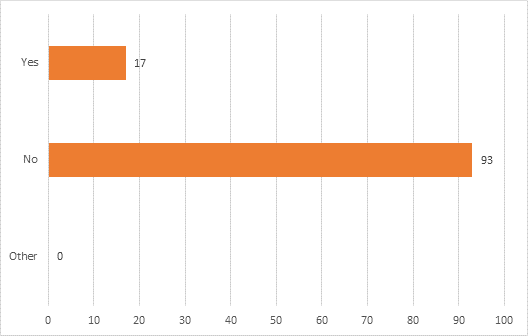
Q04-02-07. If owning a business, do you buy any material from Syrian suppliers? (If the answer in B07 is “I have my own business (trade, industry, craft, and service sector)”, “I am self-employed in a professional trade (lawyer, engineer, doctor, educator, etc.)” or “I am self-employed in the agriculture sector”) (N=110)
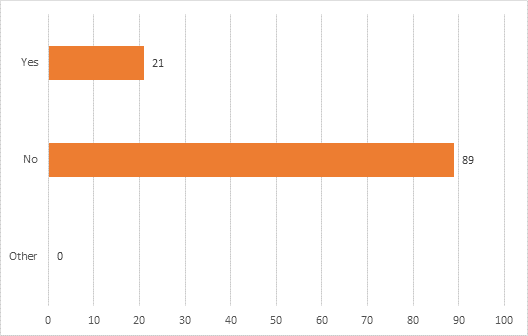
Q04-02-08. If owning a business, what is the percentage of the Syrian costumers? (If the answer in B07 is “I have my own business (trade, industry, craft, and service sector)”, “I am self-employed in a professional trade (lawyer, engineer, doctor, educator, etc.)” or “I am self-employed in the agriculture sector”) (N=110)
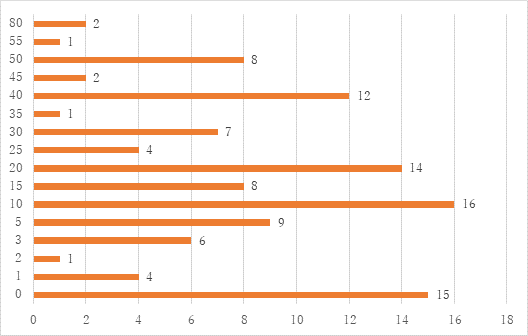
Q04-02-09. If owning a business, do you wish to have more Syrian costumers? (If the answer in B07 is “I have my own business (trade, industry, craft, and service sector)”, “I am self-employed in a professional trade (lawyer, engineer, doctor, educator, etc.)” or “I am self-employed in the agriculture sector”) (N=110)
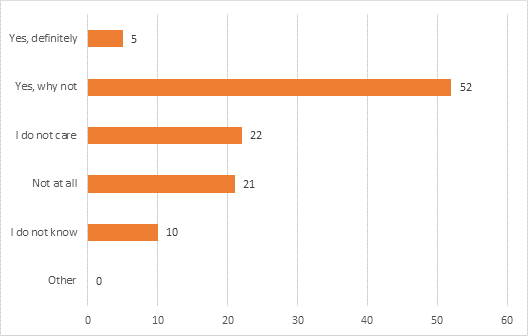
Q04-02-10. If owning a business, how has the COVID-19 pandemic affected your business? (If the answer in B07 is “I have my own business (trade, industry, craft, and service sector)”, “I am self-employed in a professional trade (lawyer, engineer, doctor, educator, etc.)” or “I am self-employed in the agriculture sector”) (multiselect) (N=110)

Q04-02-11. If owning a business, what are the solutions you used to reduce the negative impact of the COVID-19 pandemic on your business? (for those who answered B07 is “I have my own business (trade, industry, craft, and service sector)”, “I am self-employed in a professional trade (lawyer, engineer, doctor, educator, etc.)” or “I am self-employed in the agriculture sector” in B02) (multiselect) (N=110)
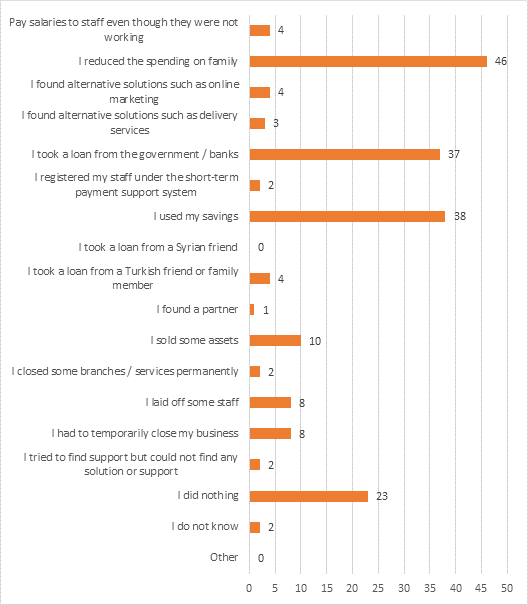
Q05. Syrian-owned businesses
Q05-01. Do you feel angry when you see Syrian businesses in your neighbourhood? (N=529)
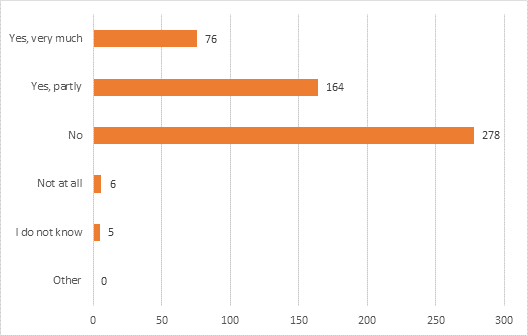
Q05-02. What do you think about the Syrian shops and restaurants? (multiselect) (N=529)
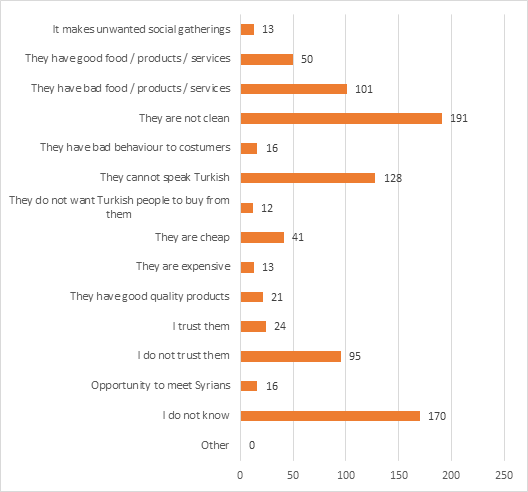
Q05-03. Do you buy from Syrian-owned enterprises? (N=529)
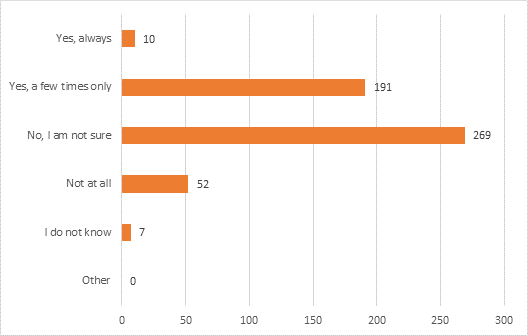
Q05-03-01. If “Yes” in Q05-03, why did you go there? (multiselect) (N=201)
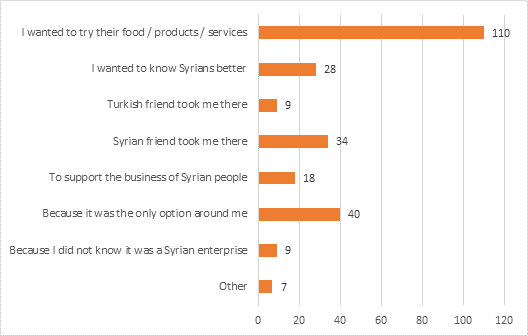
Q05-03-02. If “Yes” in Q05-03, what do you like in their places? (multiselect) (N=201)

Q05-03-03. If “Yes” in Q05-03, did you make any friends at these places? (N=201)
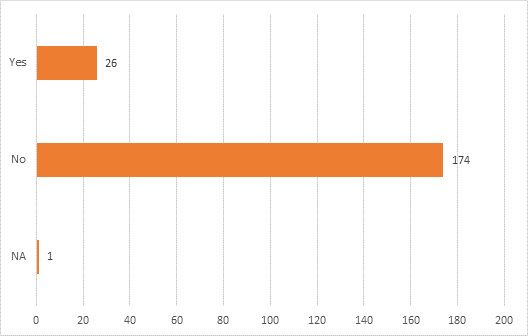
Q05-04. What kind of behaviours could make you not buy from the Syrian shops / restaurants / enterprises? (multiselect) (N=529)
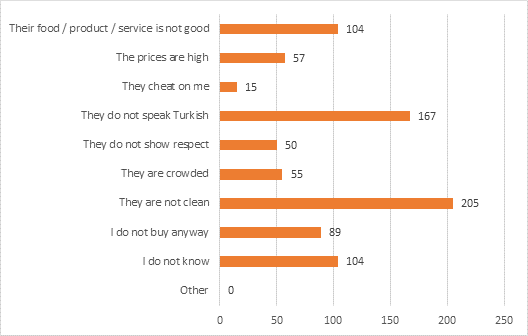
Q05-05. Would you feel more comfortable buying from Syrian businesses if the salesman was Turkish? (N=529)
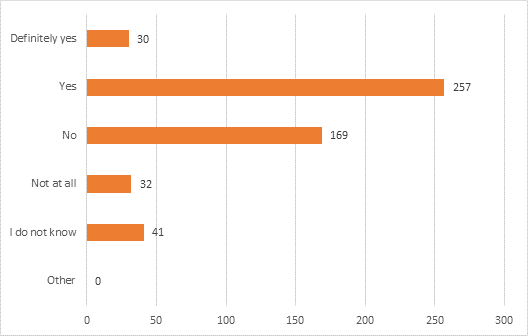
Q05-06. Would you feel more comfortable buying from Syrian businesses if the salesman spoke Turkish? (N=529)
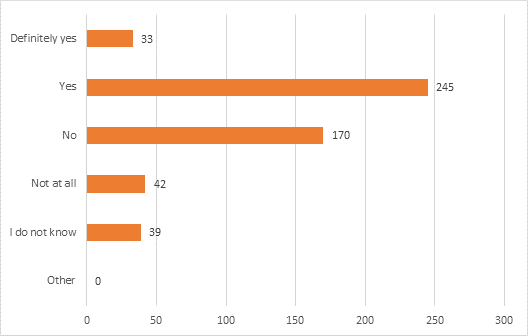
Q05-07. Would you feel more comfortable buying from Syrian businesses if the name was Turkish? (N=529)
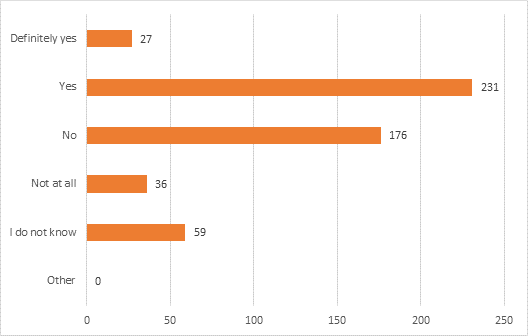
Q05-08. If Turkish places have Syrian service / product / food, will you buy it? (N=529)
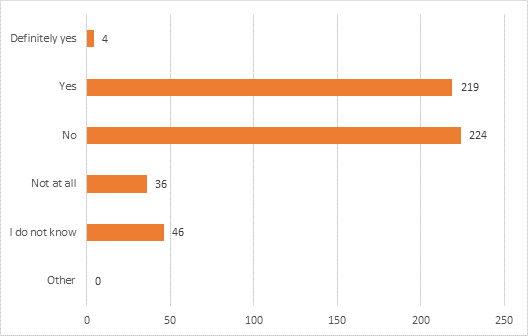
Q05-09. Do you think these businesses make the Turkish community knows the Syrians better? (N=529)
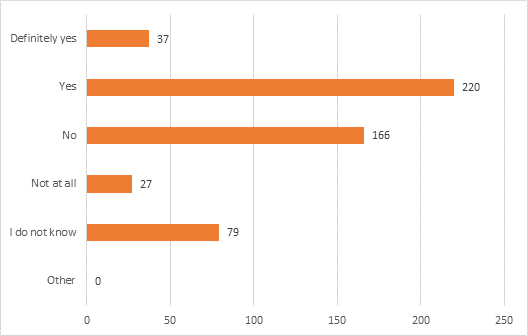
Q05-10. Do you think these Syrian-owned businesses pay taxes? (N=529)
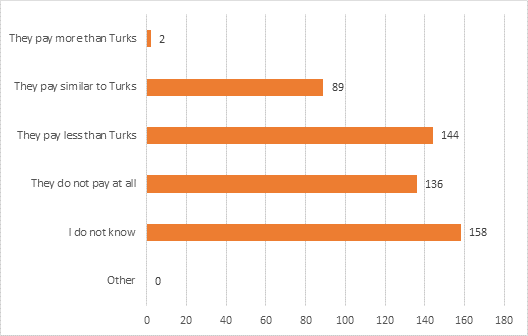
Q06. Terms and labels
Q06-01. For you personally, what comes to your mind when you hear the word refugee? (multiselect) (N=529)
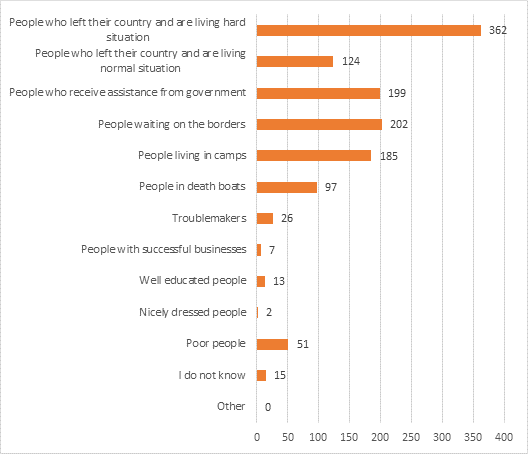
Q06-02. What do you refer to Syrians as when you talk about them? (multiselect) (N=529)
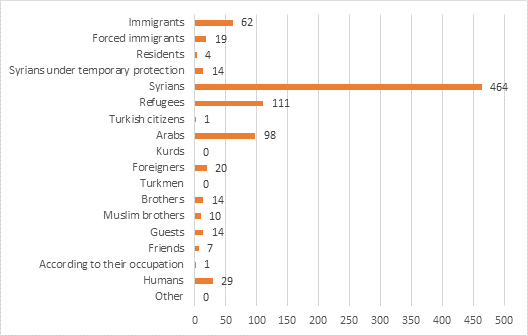
As a definition, according to Geneva Refugee Convention 1951, the term refugee is used to describe the people who left their home countries because of a well-founded fear of being persecuted for reasons of race, religion, nationality, or membership of a particular social group or political opinion, is outside the country of his nationality” and they benefit from various services and rights.
Q06-03. Do you think Syrians are refugees in Turkey (status, based on the definition; why they moved to Turkey)? (N=529)
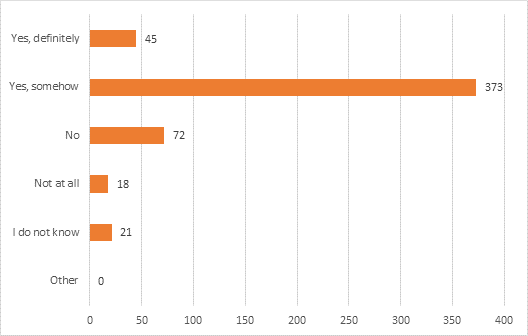
In practice, the word refugee is stereotyped and used to show that a group of people are in need, and they are the source of the problems, depend on assistance for living and are not productive in the host community.
Q06-04. Do you think Syrians are refugees in Turkey (according to the previous definition, as a living condition; they are a burden and live on humanitarian assistance only)? (N=529)
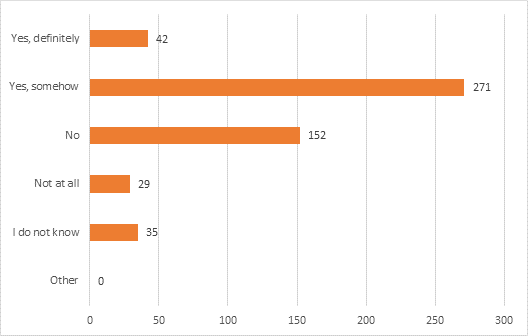
Q06-05. Which one of the following is the most appropriate term to describe Syrians in Turkey? (multiselect) (N=529)
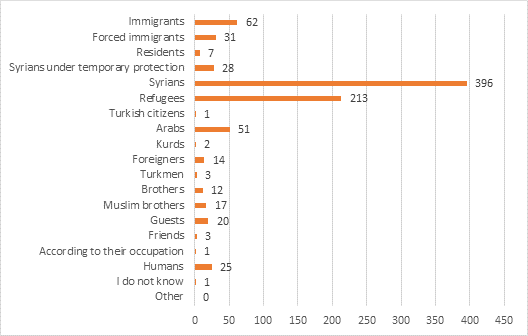
Q07. Acceptance
Q07-01. How your acceptance of Syrians has been changed over time? (N=529)
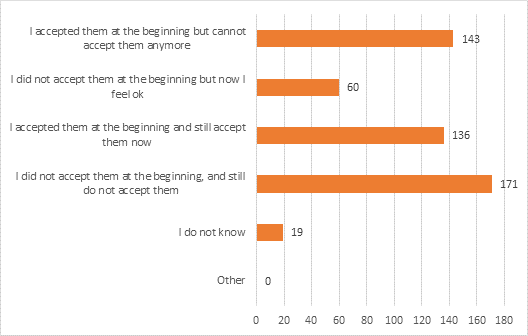
Q08. Religious factor and identity
Q08-01. Do you realize Syrians try to hide their Syrian identity in Turkey while dealing with you? (N=529)
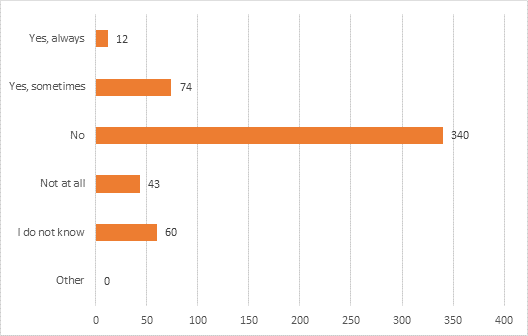
Q08-01-01. If “Yes, always” or “Yes, sometimes” in Q08-01, how do they introduce themselves instead of Syrian? (multiselect) (N=86)

Q08-02. What brings you together with Syrians? (multiselect) (N=529)
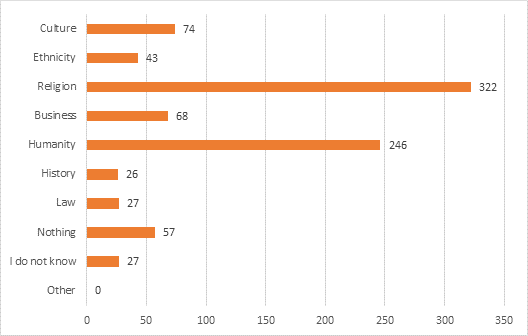
Q08-03. To what extent sharing the same religion with the Syrian community is important for you to live in harmony with Syrians? (N=529)
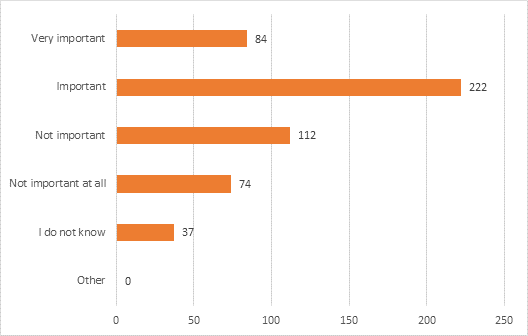
Q08-04. Would the Turkish community show the same hospitality to Syrians if they were Christians or Jews? (N=529)
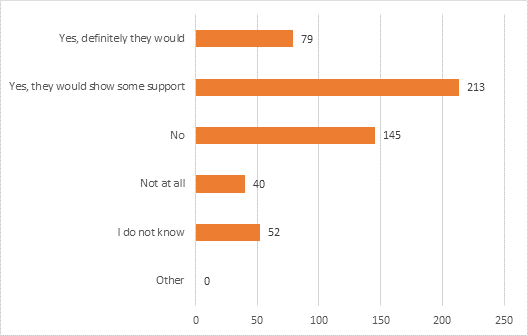
Q08-05. What do you think about Syrian community’s religious practices? (N=529)
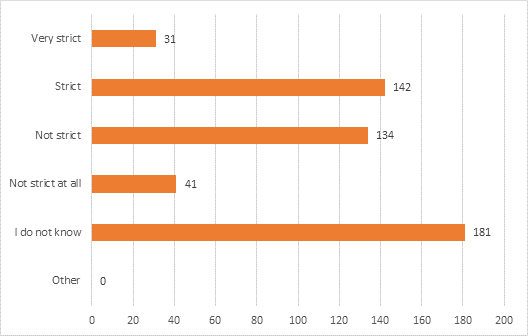
Q09. Rights
Q09-01. Do you think Syrians have equal rights to you in Turkey? (N=529)
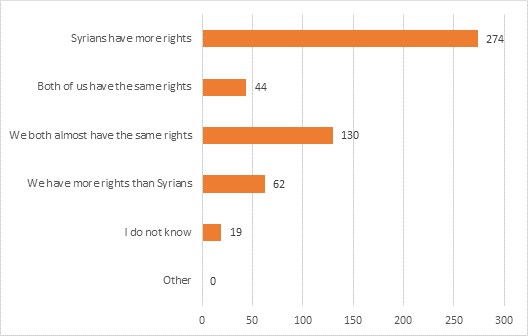
Q09-02. Do you think Syrians in Turkey and other foreigners in Turkey have equal rights? (N=529)

Q10. Migration management
Q10-01. How good is the Turkish government managing the Syrian issue in Turkey? (N=529)
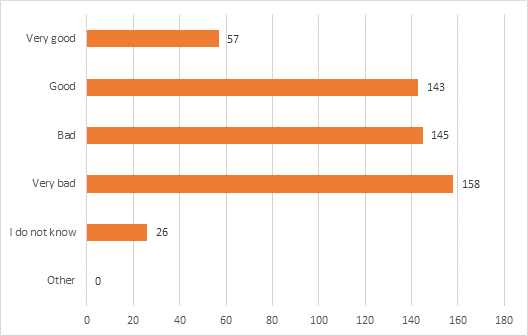
How do you describe your access to the following services after the Syrians’ arrival?.
Q10-02. Health (N=529
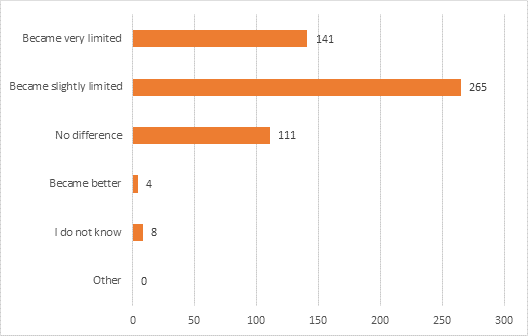
Q10-03. Employment (N=529)
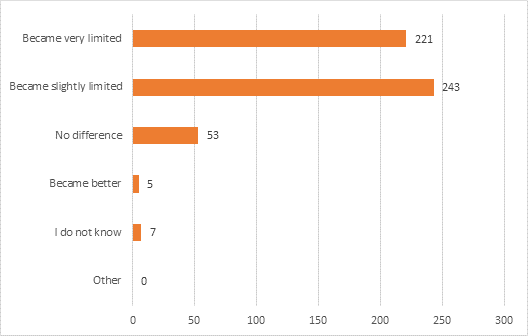
Q10-04. Education (N=529)

Q10-05. Housing (N=529)
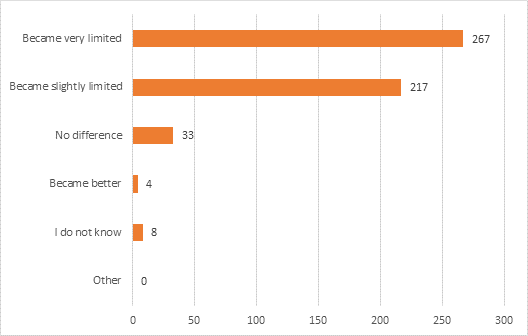
Q10-06. Do you think the government is providing extra support to Syrians than the Turkish community? (N=529)
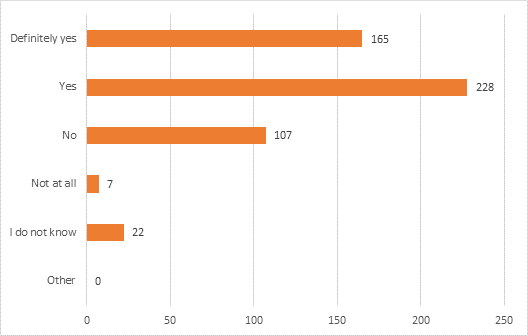
Q10-07. If not Turkey, in your opinion, which countries should be responsible for the Syrians? (multiselect) (N=529)
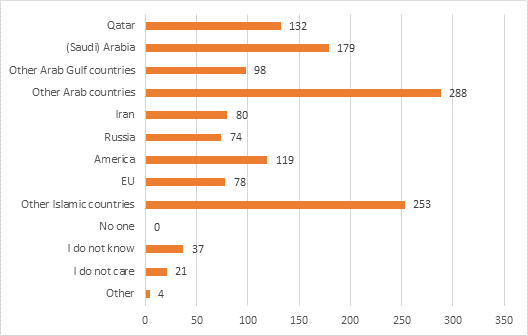
Q10-08. From which sources do you get the news about the situation of Syrians in Turkey? (multiselect) (N=529)
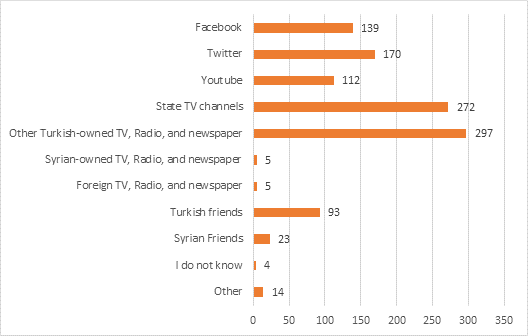
IV. Aggregated Results: Syrian Community
Interview Location
L01. District (N=529)
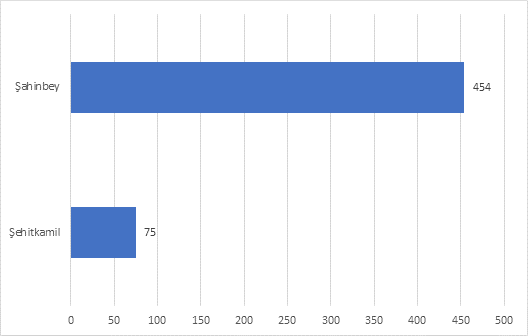
L02. Neighbourhood (N=529)
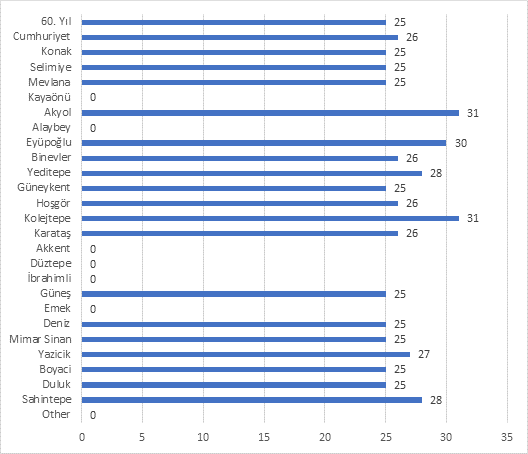
Data of Interviewees
B01. Gender (N=529)
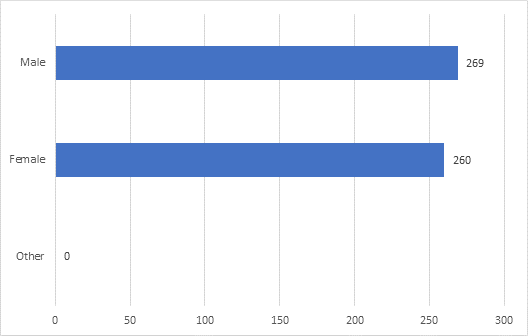
B02. Age (N=529)
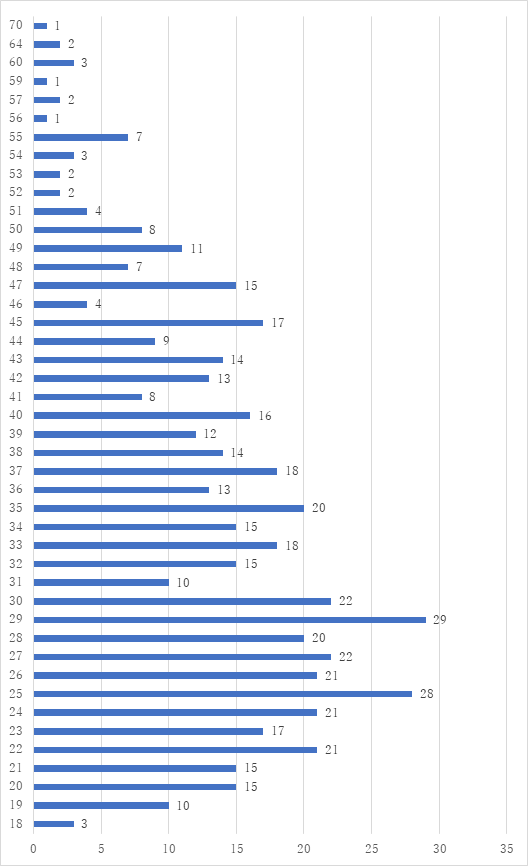
B03. Marital Status (N=529)
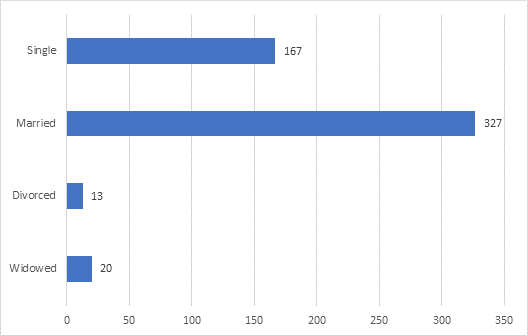
B03-01. If “Married”, “Divorced” or “Widowed” in B03, where did you get married? (N=360)
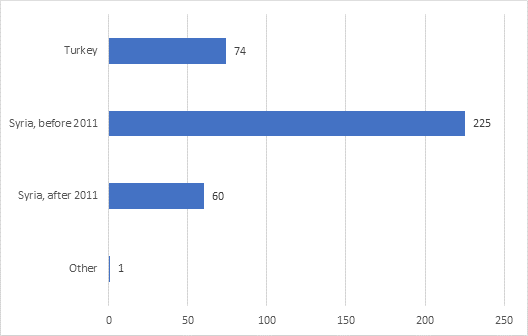
B03-02. If “Married”, “Divorced” or “Widowed” in B03, are you married to a Turkish citizen? (N=360)
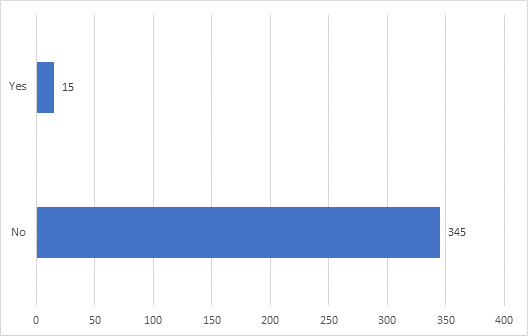
B03-03. If “Married”, “Divorced” or “Widowed” in B03, do you have children? (N=360)
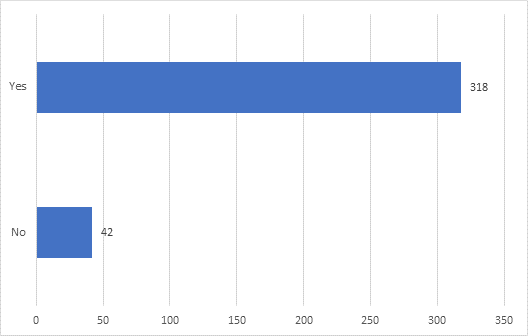
B03-04. If “Yes” in B03-3, how many children are with you in Turkey? (N=318)
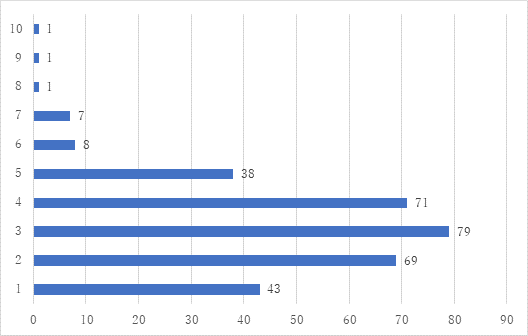
B04. Educational level (N=529)
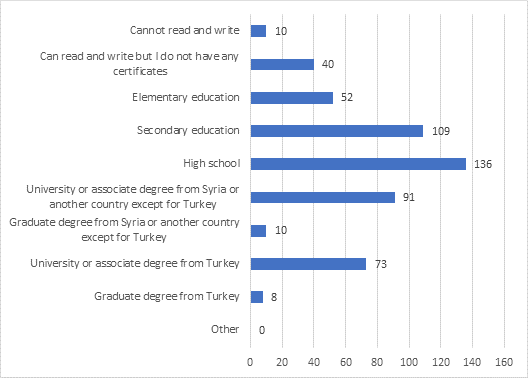
B05. Which languages do you speak except Turkish? (mutiselect) (N=529)
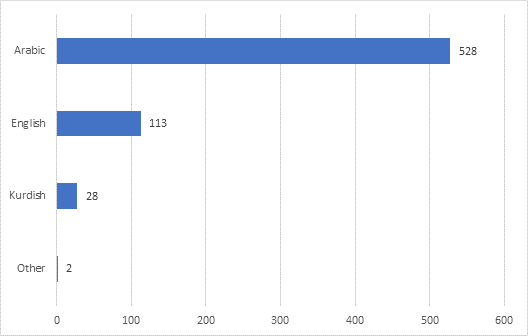
B06. When did you come to Turkey? (N=529)
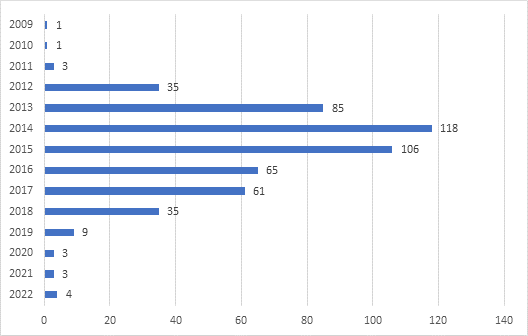
B07. How did you come to Turkey? (N=529)
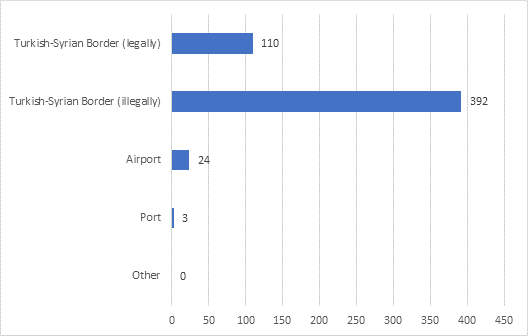
B08. Why did you leave Syria?: direct reasons (multiselect) (N=529)
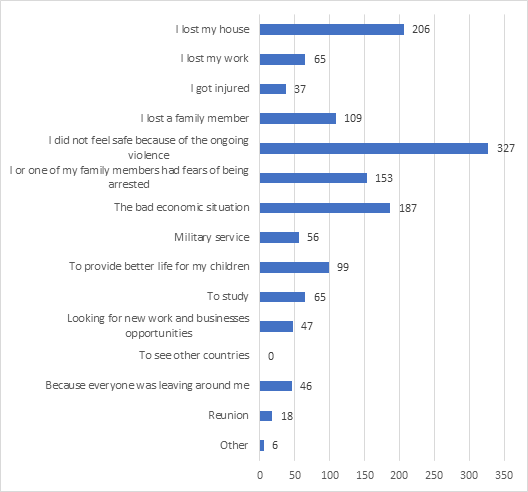
B09. Why did you choose Turkey? (multiselect) (N=529)
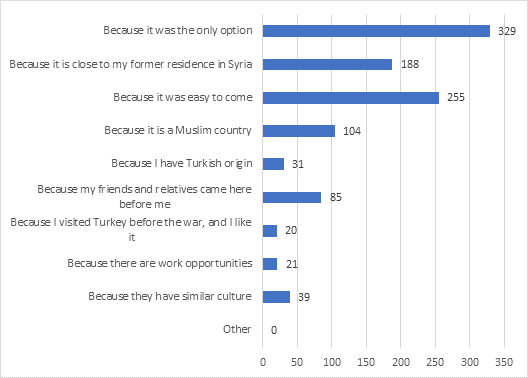
B10. Do you have any other family members living in Turkey? (N=529)
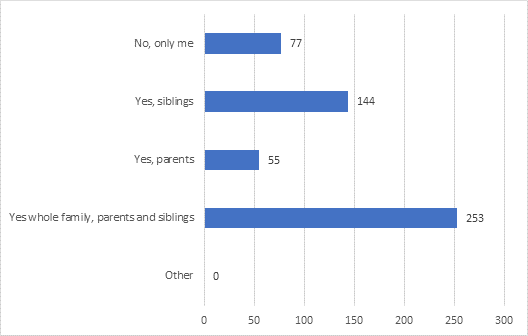
B11. Where would you go if you had the chance to choose another country? (multiselect) (N=529)
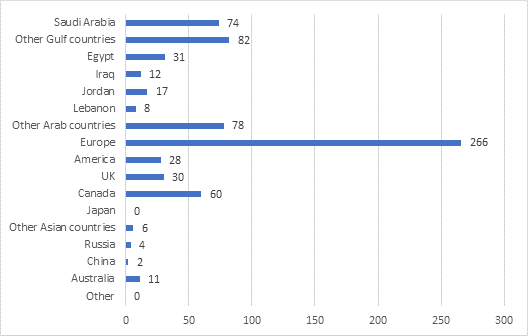
B12. Did you visit any other country before you came to Turkey? (N=529)
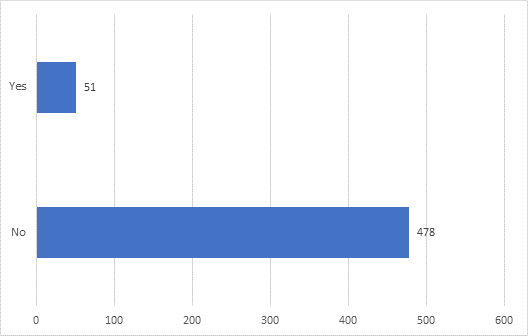
B12-01. If “Yes” in B12, why did you leave the previous country? (multiselect) (N=51)

B13. Where did you use to live in Syria (govornorate)? (N=529)
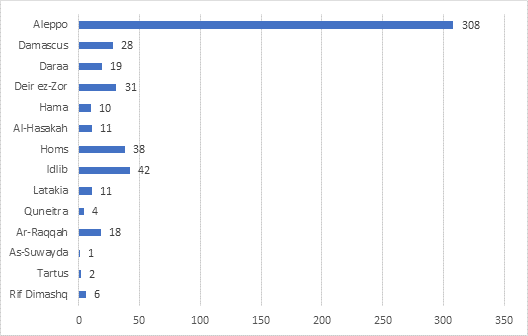
B14. Urban or Rural? (N=529)
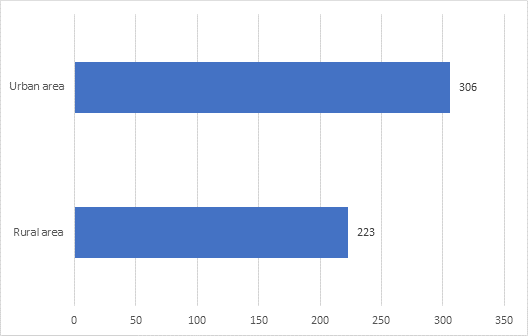
B15. What was your job before you came to Turkey? (N=529)
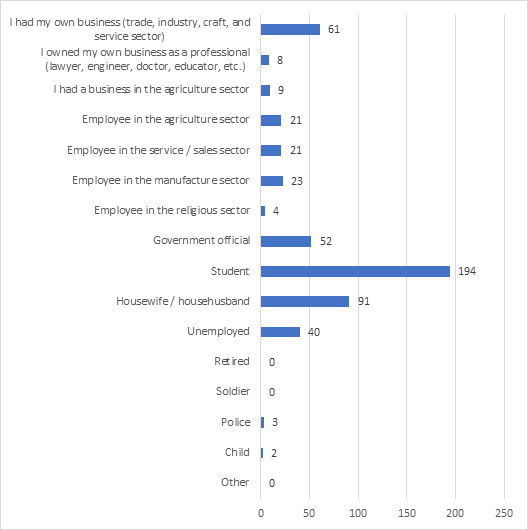
B16. Did you own a car in Syria? (N=529)
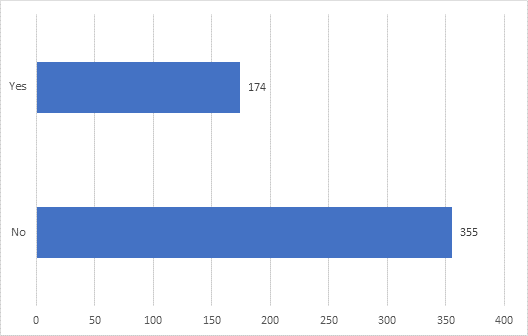
B17. Do you own a car now in Turkey? (N=529)
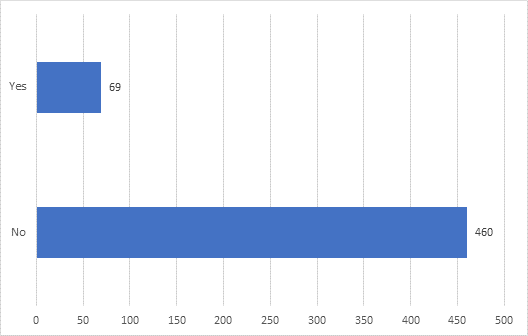
B18. Shelter status in Turkey (N=529)
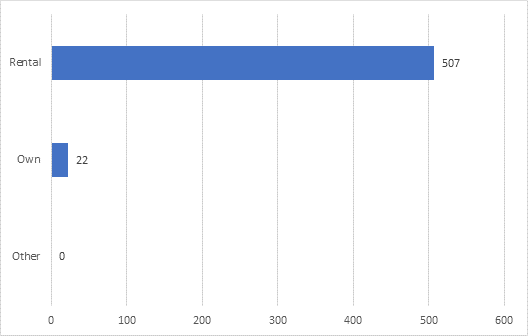
B19. What is your legal status in Turkey? (N=529)
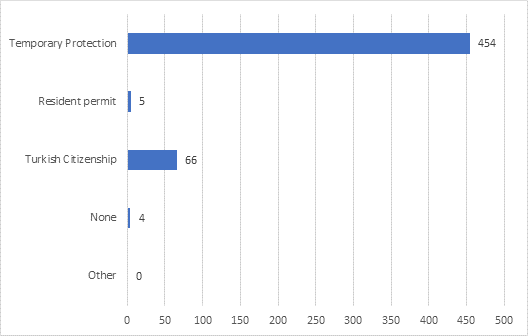
B20. Did you apply for the Turkish citizenship? (N=529)
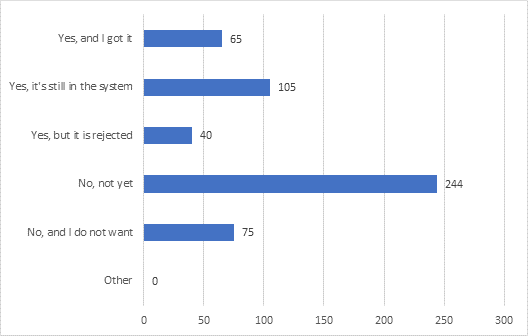
B21. Are any of your family members married to a Turkish citizen? (N=529)
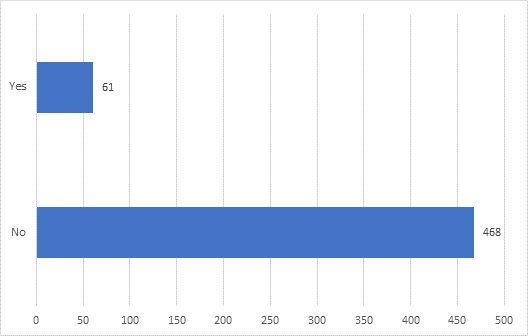
B22. Do you or one of your family members have a chronic disease or a permanent disability? (N=529)
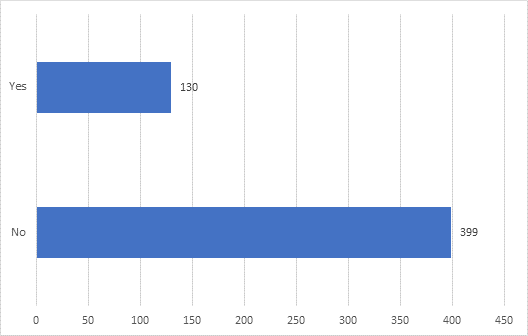
B23. Do you receive any social assistance? (N=529)
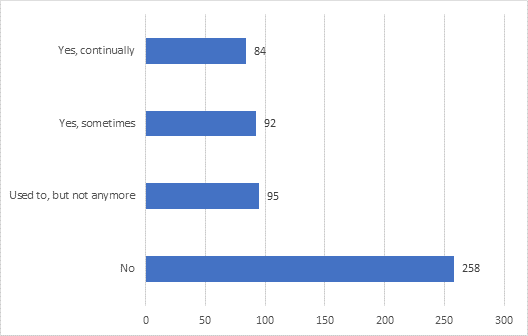
Q01. Employment
Q01-01. What is your current job? (N=529)
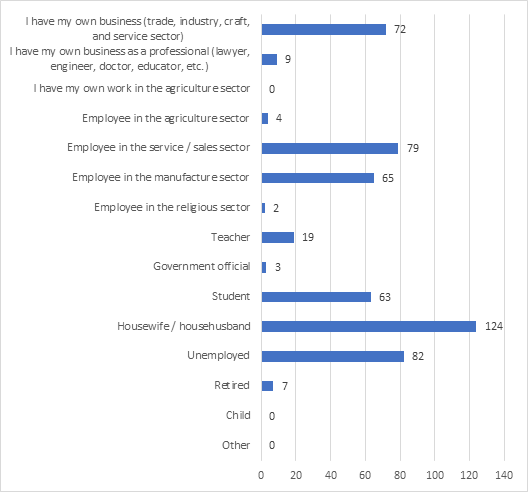
Q01-01-01. With whom do you work? (If the answer in Q01-01 is “I have my own business (trade, industry, craft, and service sector)”, “I have my own business as a professional (lawyer, engineer, doctor, educator, etc.) ”, “I have my own work in the agriculture sector”, “Employee in the agriculture sector”, “Employee in the service / sales sector”, “Employee in the manufacture sector”, “Employee in the religious sector”, “Teacher” or “Government official”) (N=253)
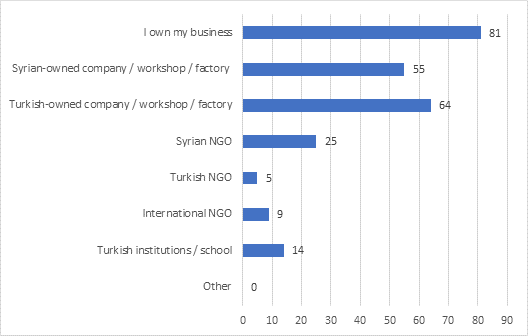
Q01-01-02. How did you find your current job? (If the answer in Q01-01 is “Employee in the agriculture sector”, “Employee in the service / sales sector”, “Employee in the manufacture sector”, “Employee in the religious sector”, “Teacher” or “Government official”) (N=172)
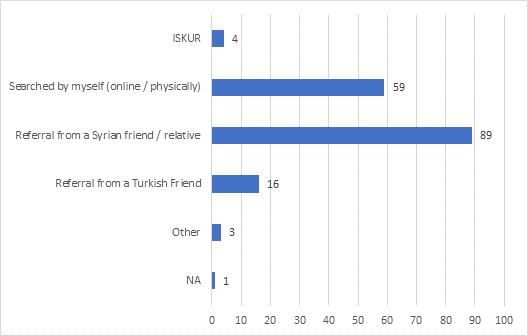
Q01-01-03. Do you have a work permit? (If the answer in Q01-01 is “I have my own business (trade, industry, craft, and service sector)”, “I have my own business as a professional (lawyer, engineer, doctor, educator, etc.) ”, “I have my own work in the agriculture sector”, “Employee in the agriculture sector”, “Employee in the service / sales sector”, “Employee in the manufacture sector”, “Employee in the religious sector”, “Teacher” or “Government official”) (N=253)

Q01-02. What do you think about your family’s monthly income in comparison with the average –4253 TL (If the answer in Q01-01 is “I have my own business (trade, industry, craft, and service sector)”, “I have my own business as a professional (lawyer, engineer, doctor, educator, etc.) ”, “I have my own work in the agriculture sector”, “Employee in the agriculture sector”, “Employee in the service / sales sector”, “Employee in the manufacture sector”, “Employee in the religious sector”, “Teacher” or “Government official”) (N=253)

Q01-03. Are you satisfied with your current monthly income? (If the answer in Q01-01 is “I have my own business (trade, industry, craft, and service sector)”, “I have my own business as a professional (lawyer, engineer, doctor, educator, etc.) ”, “I have my own work in the agriculture sector”, “Employee in the agriculture sector”, “Employee in the service / sales sector”, “Employee in the manufacture sector”, “Employee in the religious sector”, “Teacher” or “Government official”) (N=253)
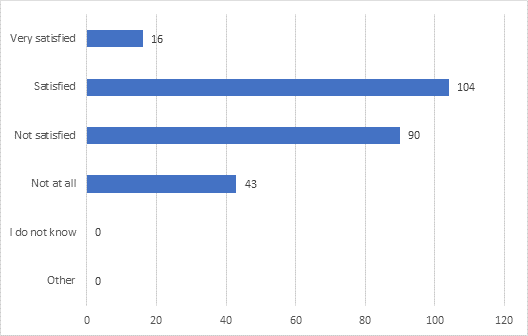
Q01-03-01. Do you have Turkish co-workers at your workplace? (If the answer in Q01-01 is “Employee in the agriculture sector”, “Employee in the service / sales sector”, “Employee in the manufacture sector”, “Employee in the religious sector”, “Teacher” or “Government official”) (N=172)
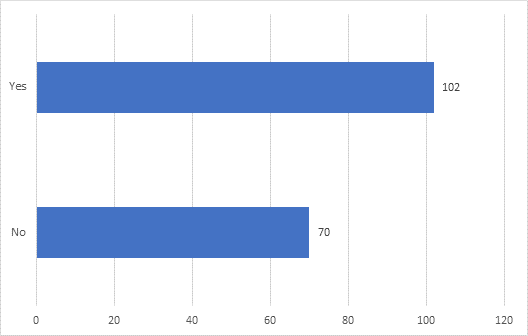
Q01-03-02. If “Yes” in Q01-03-01, how would you describe your relationship with them? (N=102)
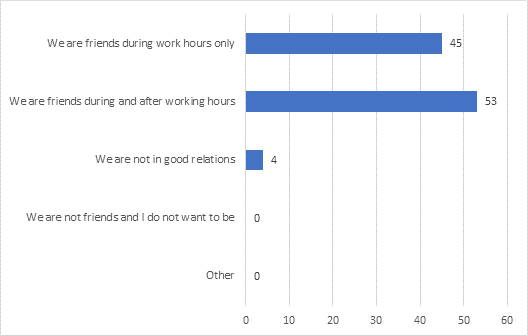
Q01-03-03. Do you want or have any interest in starting your own business someday in the future? (If the answer in Q01-01 is “Employee in the agriculture sector”, “Employee in the service / sales sector”, “Employee in the manufacture sector”, “Employee in the religious sector”, “Teacher” or “Government official”) (N=172)
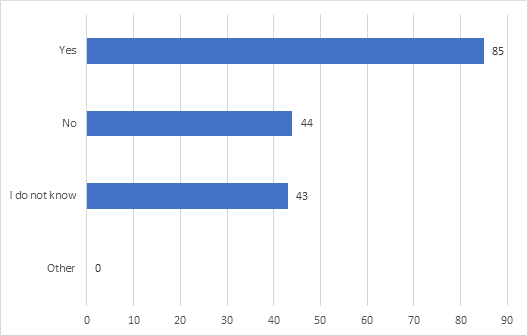
Q01-03-03-01. If “Yes” in Q01-03-03, in which sector? (N=85)
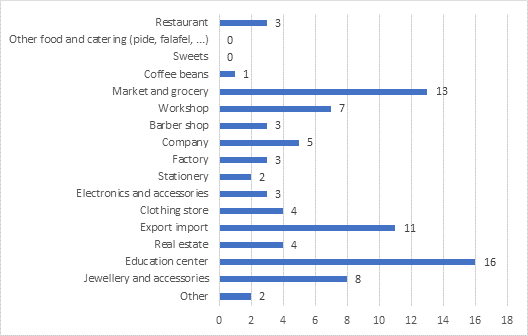
Q01-03-03-02. If “Yes” in Q01-03-3, what is preventing you? (mutlselect) (N=85)
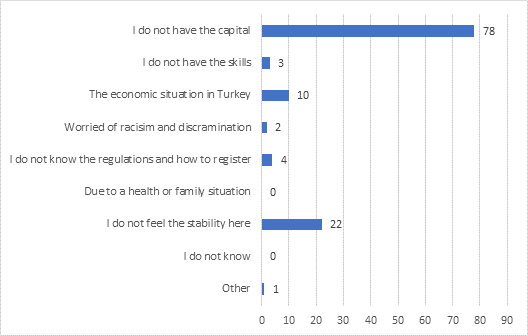
Q01-03-04. If owning a business, in which field is it? (If the answer is “My own business” in the question Q01-01-01) (N=81)
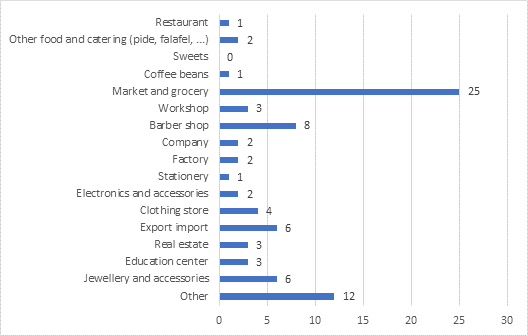
Q01-03-05. If owning a business, what is your registration status? (If the answered in Q01-01 is “I have my own business (trade, industry, craft, and service sector)”, “I have my own business as a professional (lawyer, engineer, doctor, educator, etc.)” or “I have my own work in the agriculture sector”) (N=81)
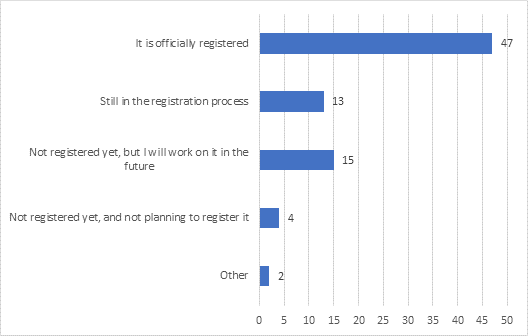
Q01-03-06. If owning a business, do you pay taxes? (If the answer in Q01-01 is“I have my own business (trade, industry, craft, and service sector)”, “I have my own business as a professional (lawyer, engineer, doctor, educator, etc.)” or “I have my own work in the agriculture sector”) (N=81)
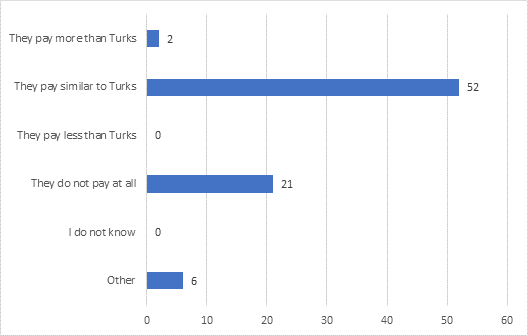
Q01-03-07. If owning a business, when did you start it? (If the answer in Q01-01 is “I have my own business (trade, industry, craft, and service sector)”, “I have my own business as a professional (lawyer, engineer, doctor, educator, etc.)” or “I have my own work in the agriculture sector”) (N=81)
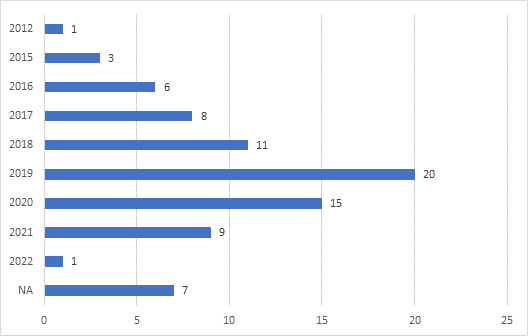
Q01-03-08. If owning a business, why did you start it? (If the answer in Q01-01 is “I have my own business (trade, industry, craft, and service sector)”, “I have my own business as a professional (lawyer, engineer, doctor, educator, etc.)” or “I have my own work in the agriculture sector”) (multiselect) (N=74)
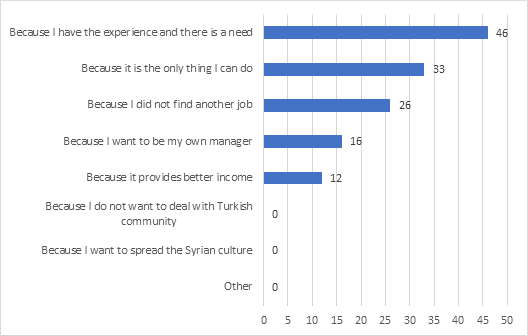
Q01-03-09. If owning a business, how many staff do you have? (except you) (If the answered in Q01-01 is “I have my own business (trade, industry, craft, and service sector)”, “I have my own business as a professional (lawyer, engineer, doctor, educator, etc.)” or “I have my own work in the agriculture sector”) (N=81)
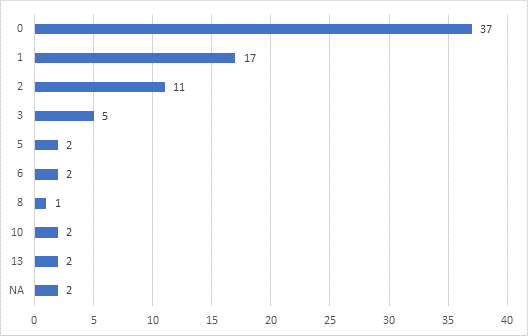
Q01-03-10. If owning a business, do you have any Turkish staff? (If the answered in Q01-01 is “I have my own business (trade, industry, craft, and service sector)”, “I have my own business as a professional (lawyer, engineer, doctor, educator, etc.)” or “I have my own work in the agriculture sector”) (N=81)
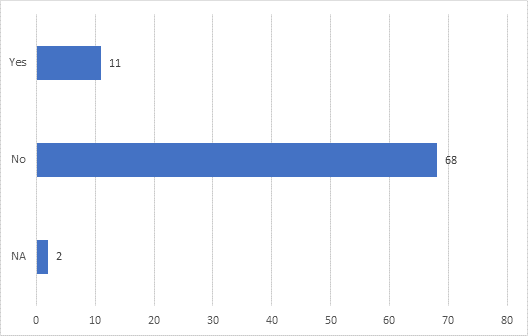
Q01-03-11. If owning a business, do you have a Turkish partner? (If the answer in Q01-01 is “I have my own business (trade, industry, craft, and service sector)”, “I have my own business as a professional (lawyer, engineer, doctor, educator, etc.)” or “I have my own work in the agriculture sector”) (N=81)
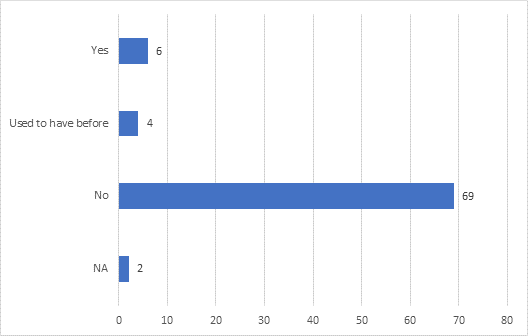
Q01-03-12. If owning a business, where do you buy your raw material from? (If the answered in Q01-01 is “I have my own business (trade, industry, craft, and service sector)”, “I have my own business as a professional (lawyer, engineer, doctor, educator, etc.)” or “I have my own work in the agriculture sector”) (N=81)
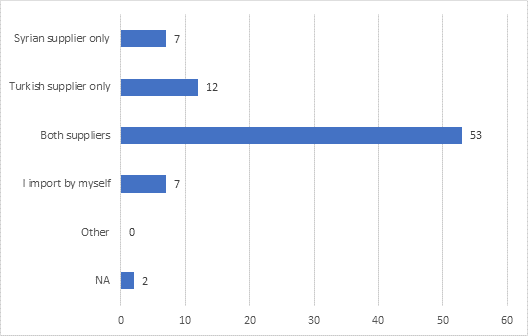
Q01-03-13. If owning a business, what is the percentage of the Turkish costumers? (If the answered in Q01-01 is “I have my own business (trade, industry, craft, and service sector)”, “I have my own business as a professional (lawyer, engineer, doctor, educator, etc.)” or “I have my own work in the agriculture sector”) (N=81)
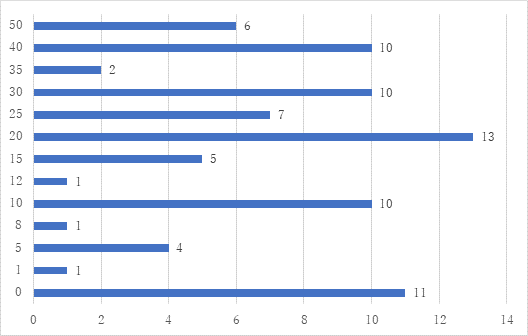
Q01-03-14. If owning a business, do you wish to get more Turkish costumers? (If the answered in Q01-01 is “I have my own business (trade, industry, craft, and service sector)”, “I have my own business as a professional (lawyer, engineer, doctor, educator, etc.)” or “I have my own work in the agriculture sector”) (N=81)
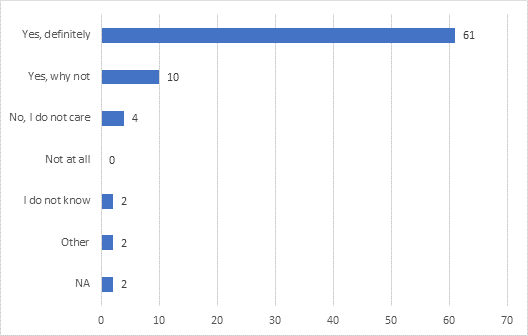
Q01-03-15. If owning a business, why do Turkish buy from your business? (If the answered in Q01-01 is “I have my own business (trade, industry, craft, and service sector)”, “I have my own business as a professional (lawyer, engineer, doctor, educator, etc.)” or “I have my own work in the agriculture sector”) (multiselect) (N=79)
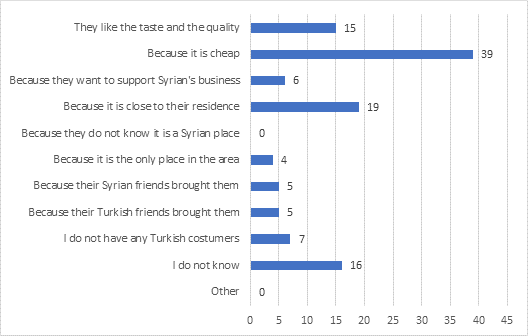
Q01-03-16. If owning a business, did you make any friends from your Turkish costumers? (If the answered in Q01-01 is “I have my own business (trade, industry, craft, and service sector)”, “I have my own business as a professional (lawyer, engineer, doctor, educator, etc.)” or “I have my own work in the agriculture sector”) (N=81)
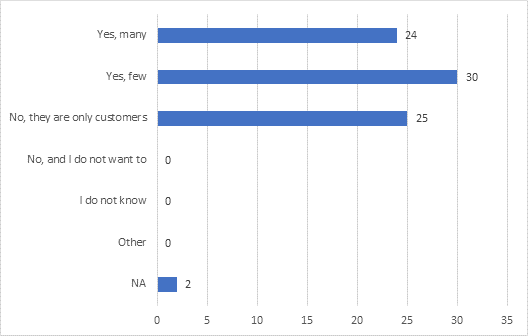
Q01-03-17. If owning a business, what is your future business plan? (If the answered in Q01-01 is “I have my own business (trade, industry, craft, and service sector)”, “I have my own business as a professional (lawyer, engineer, doctor, educator, etc.)” or “I have my own work in the agriculture sector”) (N=81)
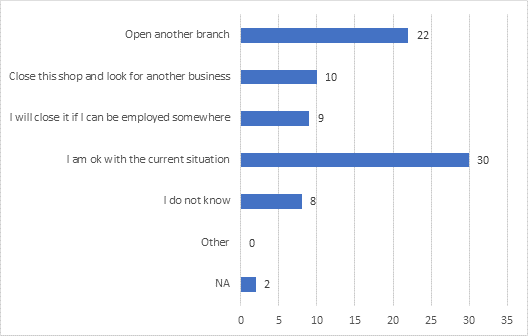
Q01-03-18. If owning a business, what are the main challenges you are facing? (multiselect) (If the answered in Q01-01 is “I have my own business (trade, industry, craft, and service sector)”, “I have my own business as a professional (lawyer, engineer, doctor, educator, etc.)” or “I have my own work in the agriculture sector”) (N=79)
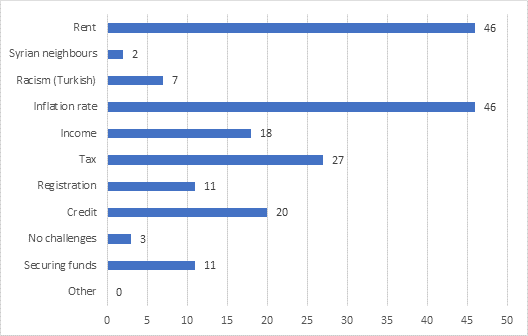
Q01-03-19. If owning a business, how has the COVID-19 pandemic affected your business? (multiselect) (If the answered in Q01-01 is “I have my own business (trade, industry, craft, and service sector)”, “I have my own business as a professional (lawyer, engineer, doctor, educator, etc.)” or “I have my own work in the agriculture sector”) (N=81)
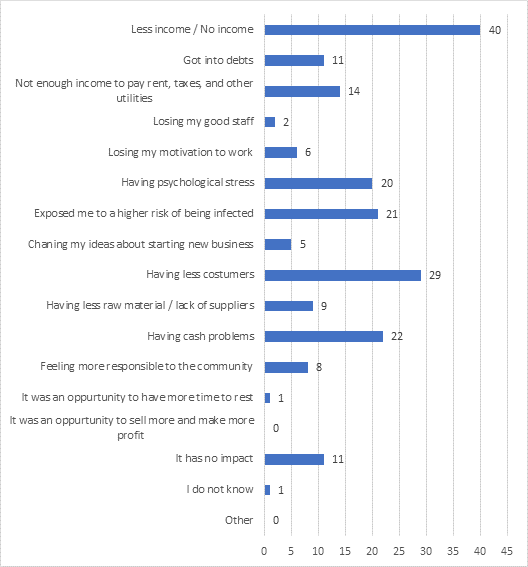
Q01-03-20. If I have my own business, what are the solutions you used to reduce the negative impact of the COVID-19 pandemic on your business? (multiselect) (for those who answered “I have my own business (trade, industry, craft, and service sector)”, “I have my own business as a professional (lawyer, engineer, doctor, educator, etc.)” or “I have my own work in the agriculture sector” in Q01-01) (N=81)
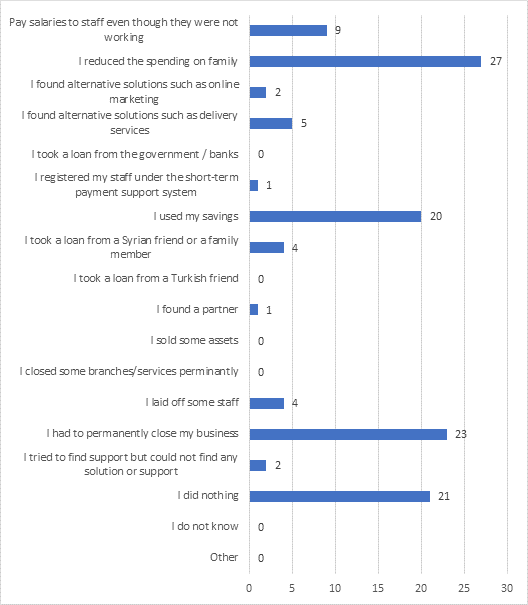
Q01-04. Financially, do you think Syrians are a burden to the Turkish community? (N=529)
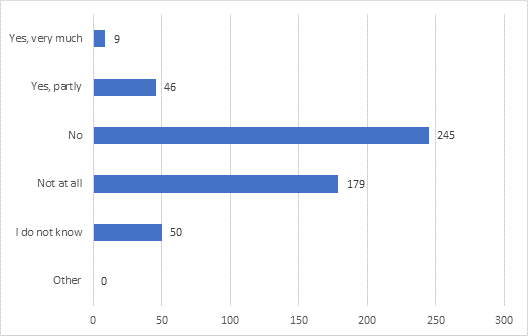
Q01-05. Do you think Syrians are the cause for the economic crises in Turkey? (N=529)
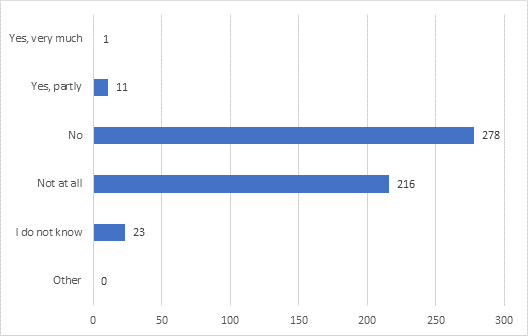
Q02. Housing
Q02-01. How did you find your current home? (N=529)
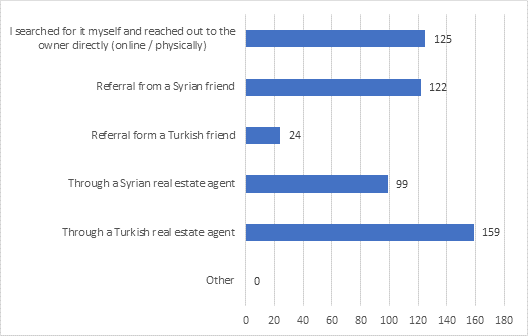
Q02-02. How difficult was renting a place? (N=529)
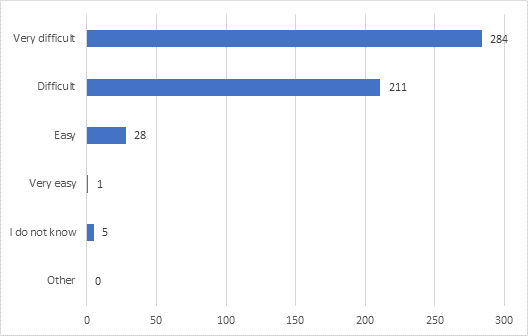
Q02-03. What is the main difficulty with your current place? (multiselect) (N=529)

Q03. Health
Q03-01. Do you have access to free health services? (N=529)
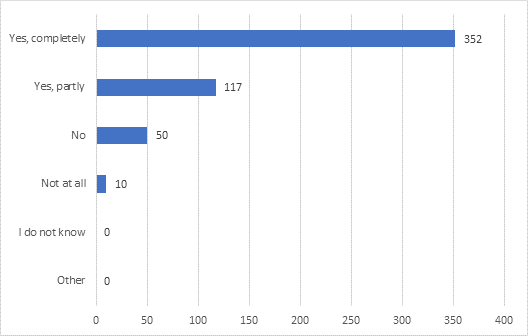
Q03-01-01. If “Yes” in Q03-01, how would you describe the quality of the health service you receive? (N=469)
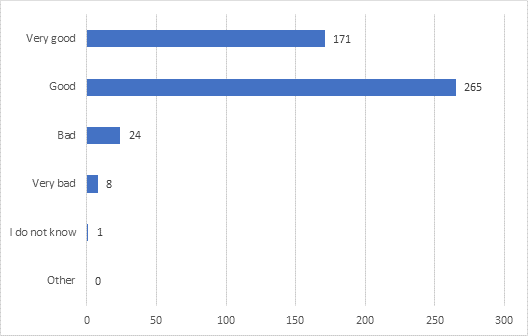
Q03-02. Do you go to Syrian clinics? (N=529)
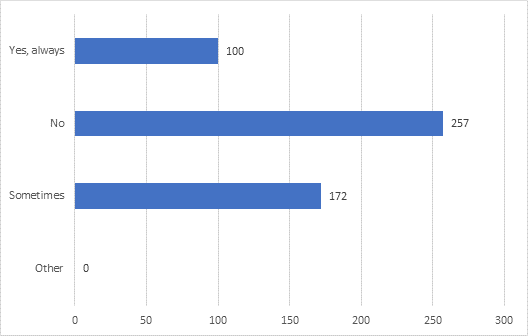
Q03-02-01. If “Yes” in Q03-02, why? (multiselect) (N=529)
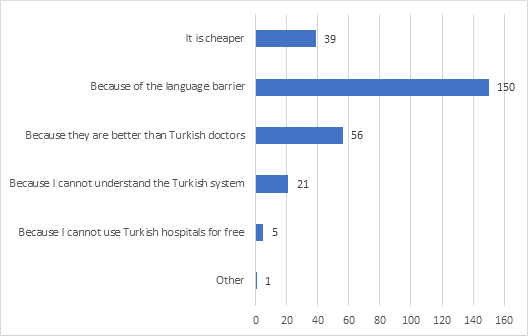
Q04. Education
Q04-01. Do you / your wife / children currently study in Turkish schools / universities? (N=529)
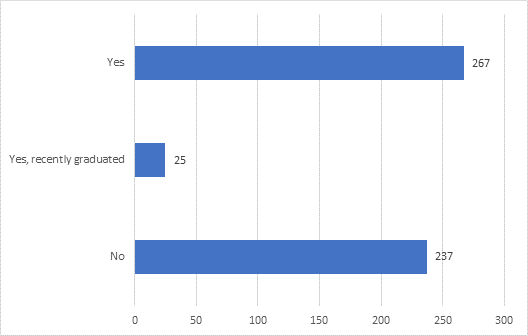
Q04-01-01. If “Yes” or “Yes, recently graduated” in Q04-01, was it difficult registering for the education service? (N=292)

Q04-01-02. If “Yes” or “Recently graduated” in Q04-01, do you / your children have Turkish friends in the school / university? (N=292)
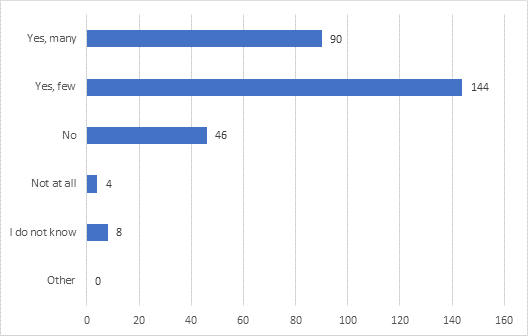
Q04-01-03. If “Yes” or “Recently graduated” in Q04-01, do you / your children face any discrimination in schools / universities? (N=292)
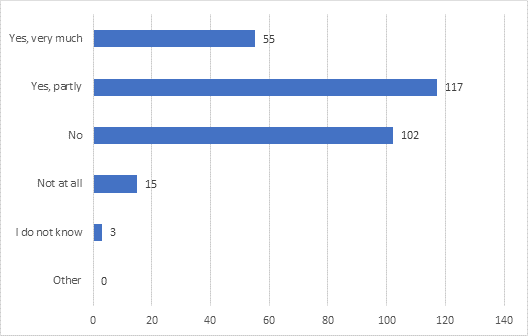
Q04-01-04. If “Yes” or “Recently graduated” in Q04-01, do you / your children pay for education? (N=292)
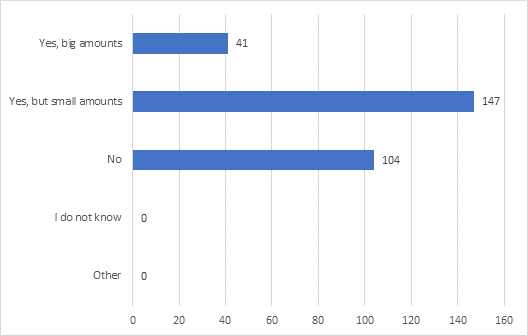
Q05. Social bridges
Q05-01. What percentage of the Syrians living in your neighbourhood compared to Turkish? (N=529)
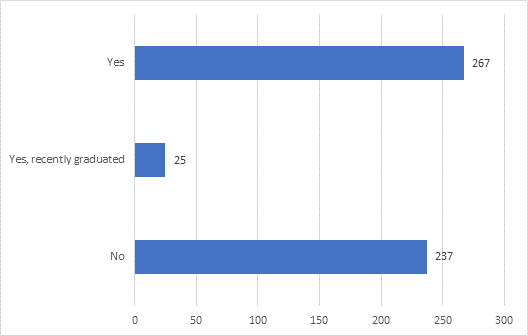
Q05-02. How would you describe your communication with the Syrian community around you? (N=529)
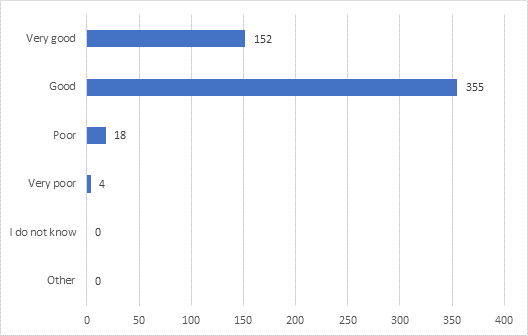
Q05-03. How often do you meet with your Syrian Friends? (N=529)
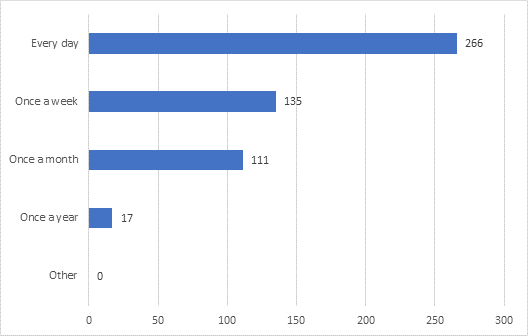
Q05-04. Where do you meet with your Syrian friends? (multiselect) (N=529)
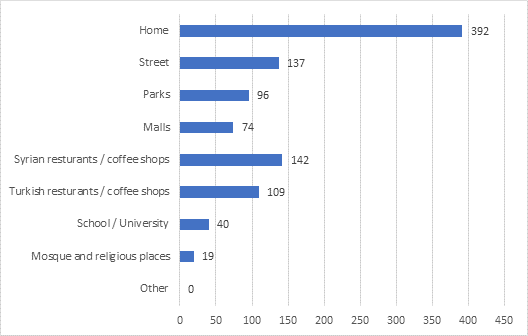
Q05-05. Do you still have any family members living in Syria? (N=529)
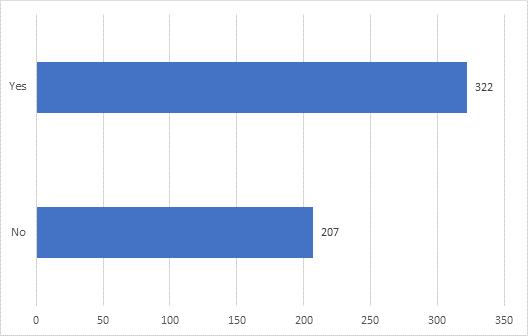
Q05-05-01. If “Yes” in Q05-05, are you in contact with them? (N=322)
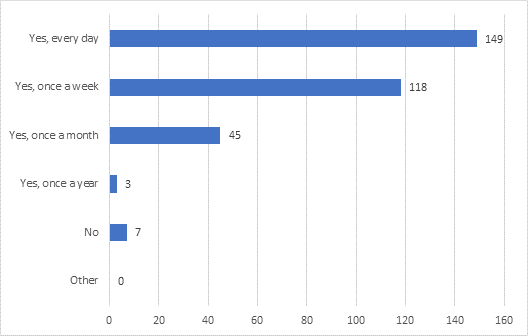
Q05-06. Do you have any family members living in Europe? (N=529)
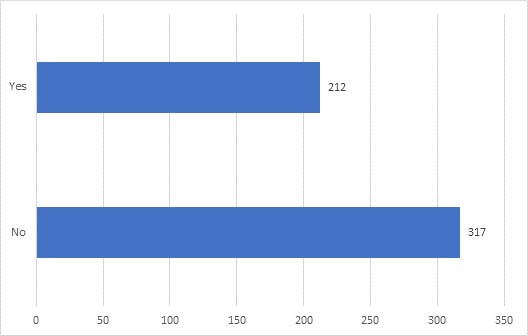
Q05-06-01. If “Yes” in Q05-06, are you in contact with them? (N=212)

Q06. Social bonds
Q06-01. Did you participate in the integration program of the DGMM or any other NGO? (N=529)
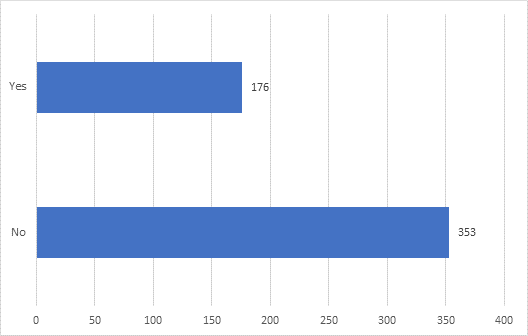
Q06-01-01. If “Yes” in Q06-01, does it impact your daily life and dealing with the Turkish community? (N=176)
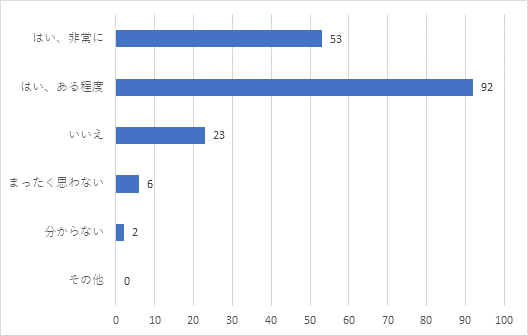
Q06-02. Do you feel you are a part of the host community? (N=529)
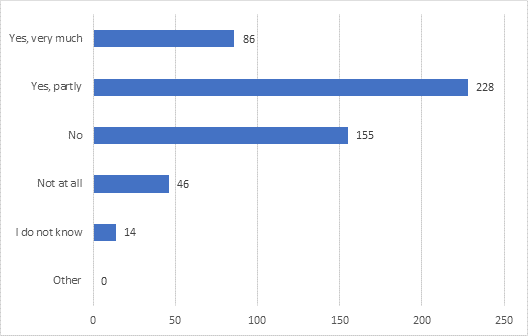
Q06-03. Do you have any close Turkish friends? (N=529)
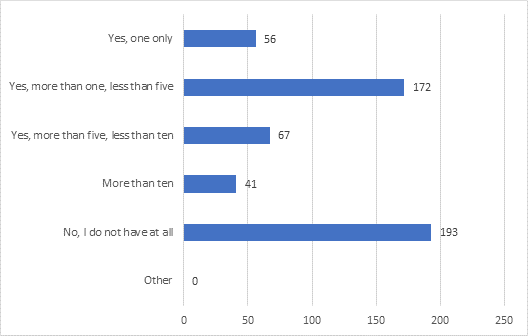
Q06-03-01. Where did you meet them? (If the answer is “Yes, one only”, “Yes, more than one, less than five”, “Yes, more than five, less than ten” or “More than ten” in the question Q06-03) (multiselect) (N=336)

Q06-04. Where do you buy your groceries from? (multiselect) (N=529)
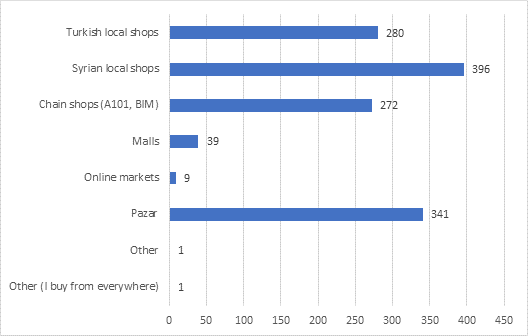
Q06-05. Would you buy more from local Turkish shops / chain shops if they had Syrian staff? (N=529)
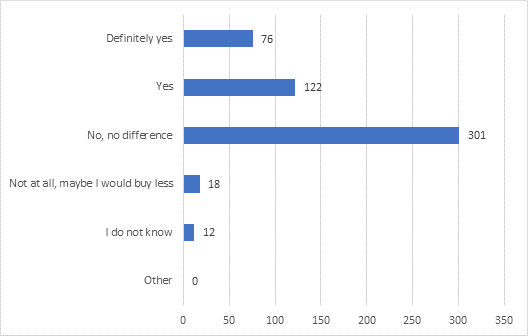
Q06-06. Would you buy more from local Turkish shops / chain shops if the salesman spoke Arabic? (N=529)

Q06-07. Would you buy more from Turkish local shops / chain shops if they had Syrian products? (N=529)
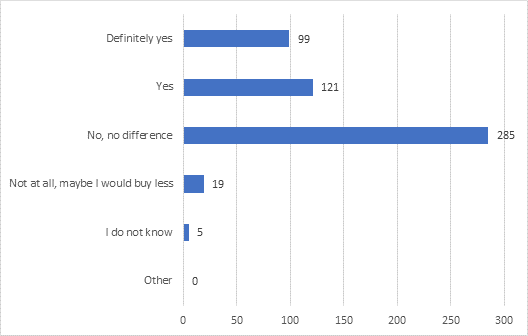
Q06-08. Where do you buy big items from (TV, Washing machine, Furniture,…)? (multiselect) (N=529)

Q06-09. Do you feel agitated when dealing with Turkish people outside? (N=529)
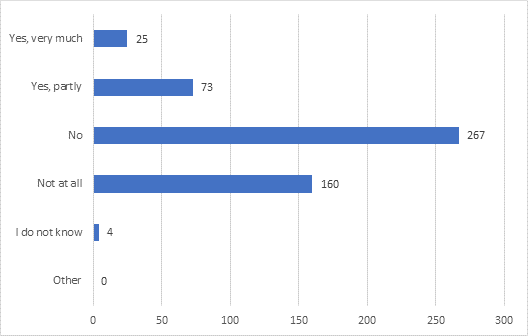
Q06-10. Do you greet your Turkish neighbours when you see them outside? (N=529)
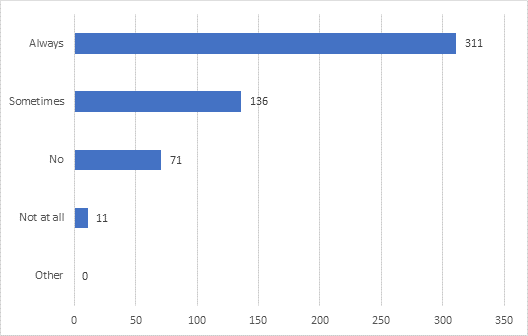
Q06-11. Do your Turkish neighbours greet you when they see you outside? (N=529)
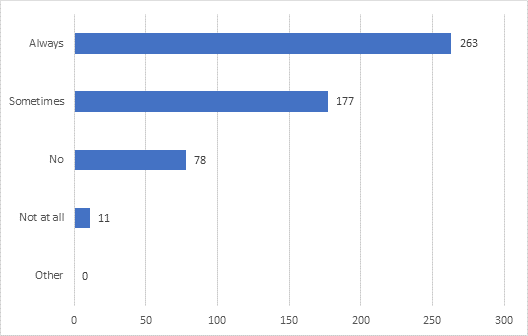
Q06-12. Did you encounter any misunderstanding or problem with the Turkish people around you? (N=529)

Q06-13. Did you face discriminatory behaviours during your stay in Turkey at least once? (N=529)
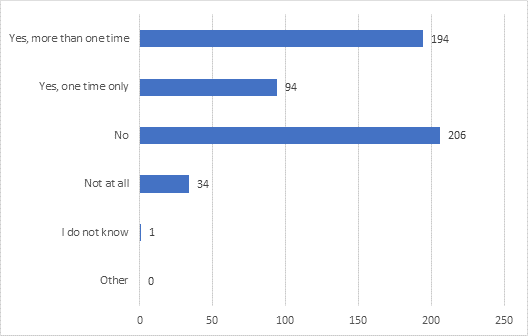
Q06-14. What do you do when you face discrimination and racism? (N=529)
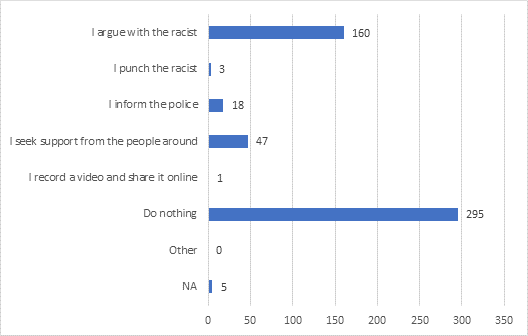
Q06-15. In your opinion, why does the Turkish community show racism and discrimination against Syrians? (multiselect) (N=529)
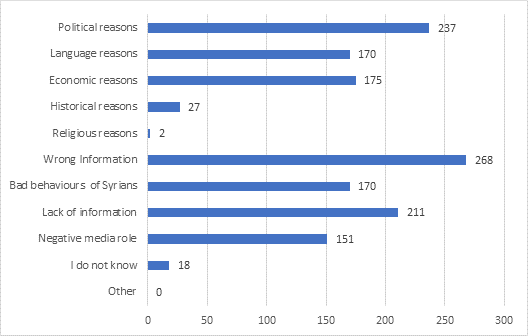
Q06-16. How would you describe the treatment of the Turkish official staff in Governmental Institutions? (N=529)
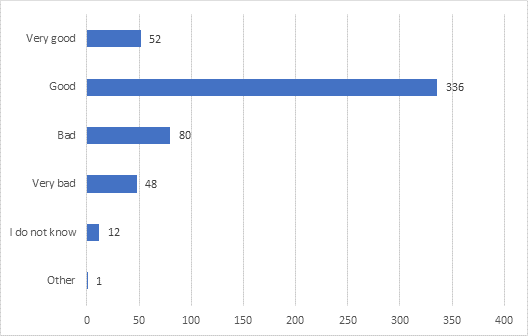
Q06-17. To what extent do you think the Turkish government is managing the Syrians’ issue in Turkey? (N=529)
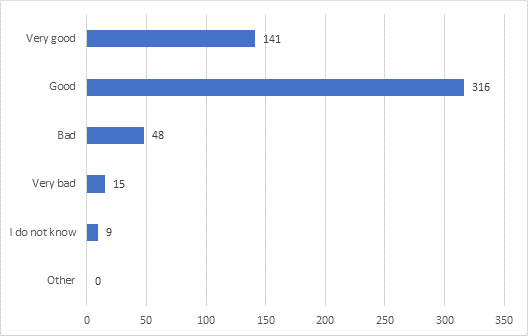
Q06-18. Do you think the Syrians who got Turkish citizenship face less racism and discrimination? (N=529)
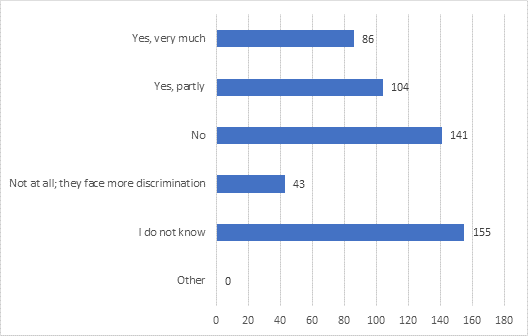
Q06-19. What is the most difficult thing for you in Turkey? (multiselect) (N=529)
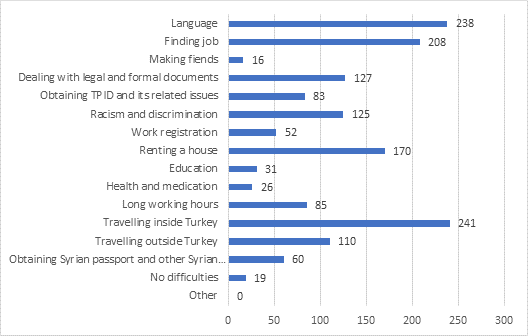
Q06-20. By living the same risk and having the same fears, how did the COVID_19 pandemic affect the relationship between Turkish and Syrian communities? (N=529)
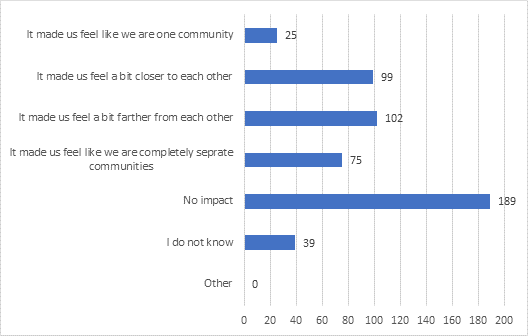
Q07. Language and cultural knowledge
Q07-01. How would you describe your Turkish Language skills? (N=529)
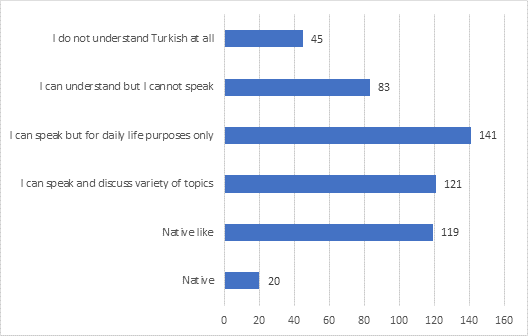
Q07-02. Clothing and style (N=529)
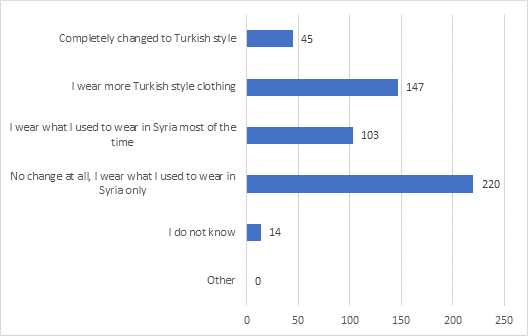
Q07-03. Eating indoor (food you eat at home) (N=529)
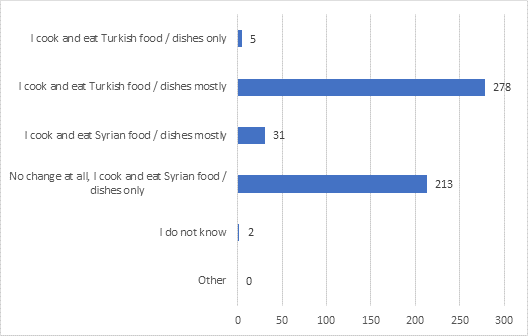
Q07-04. Eating outdoor (N=529)
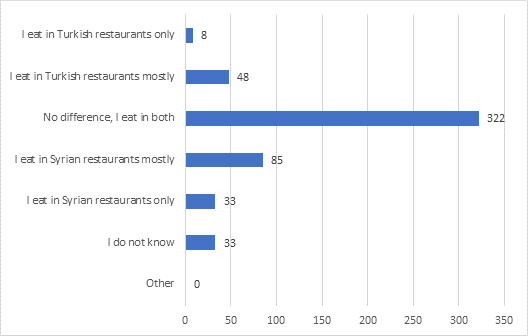
Q07-05. Social gatherings (weddings, celebrations, religious events, …) (N=529)
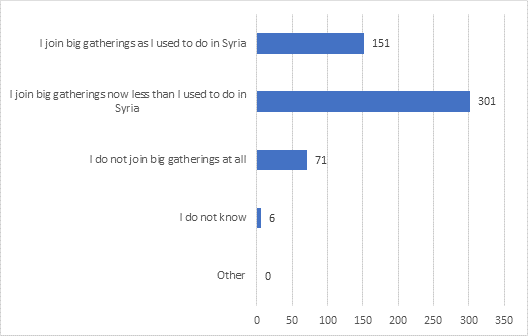
Q07-06. Religious practices of the Syrian community in general (N=529)
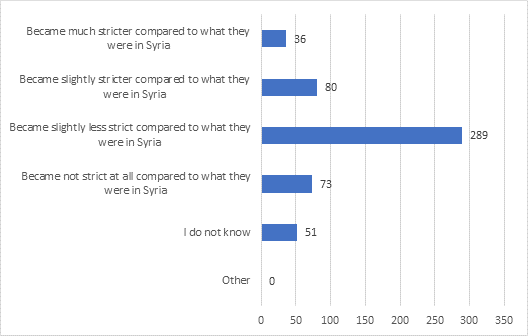
Q07-07. To what extent do you think the Turkish community know the Syrian community? (N=529)
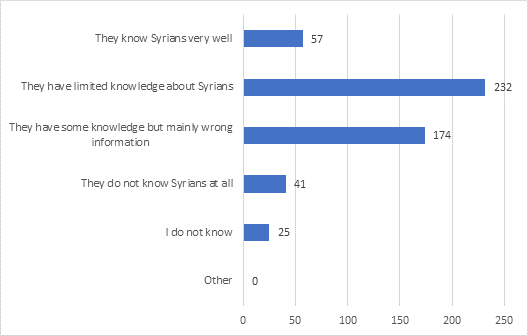
Q07-08. To what extent do you know the Turkish community? (N=529)
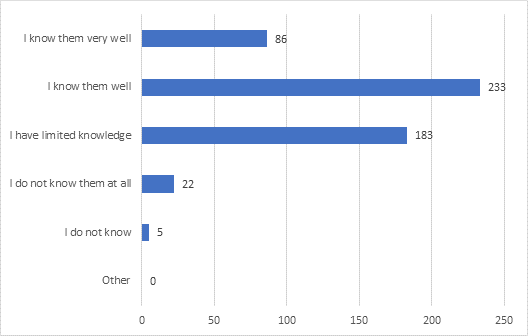
Q07-09. How do you think the Turkish community think about Syrians compared to last year? (N=529)
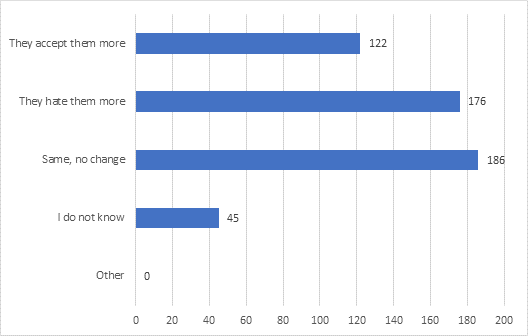
Q07-10. Which one do you think is more welcomed and accepted by the Turkish community? (N=529)

Q07-10-01. If “Syrians” in Q07-10, why? (multiselect) (N=188)

Q07-10-02. If “Afghan” in Q07-10, why? (multiselect) (N=5)
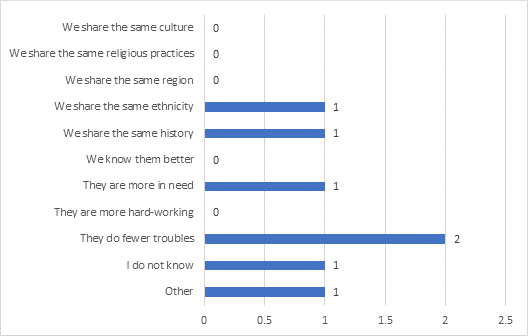
Q07-11. Do you think Syrian-owned enterprises (restaurants and shops, for example) attract the Turkish community? (N=529)
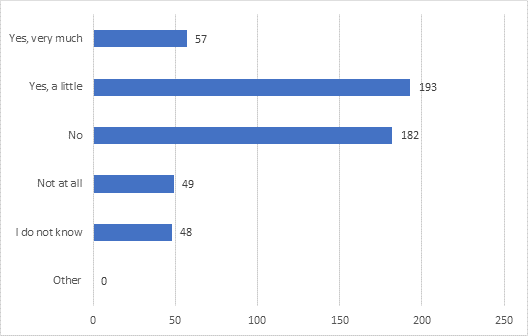
Q07-11-01. If “Yes, very much” or “Yes” in Q07-11, why? (multiselect) (N=250)
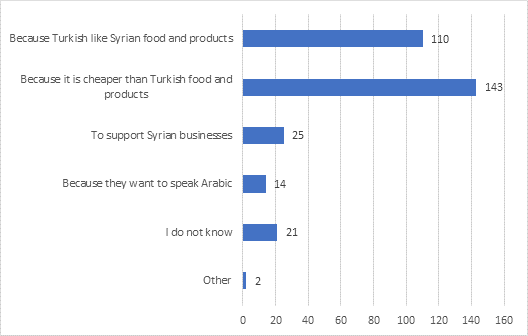
Q07-11-02. If “No” or “Not at all” in Q07-11, why not? (multiselect) (N=231)
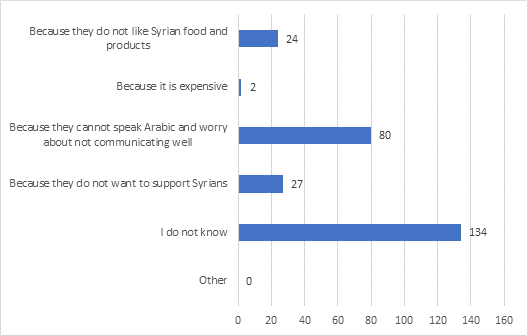
Q07-12. Do you think Syrian-owned enterprises (restaurants and shops, for example) adequately represent the Syrian culture? (N=529)
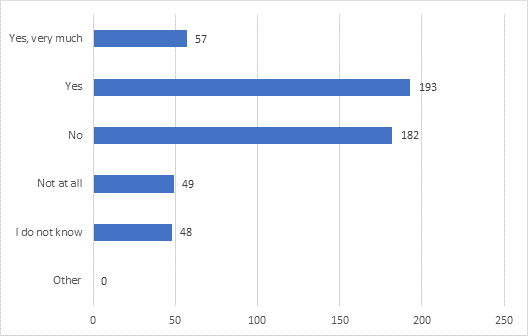
Q07-13. What should Syrian restuaurants and shops do to attract more Turkish people (mutlselect)? (N=529)
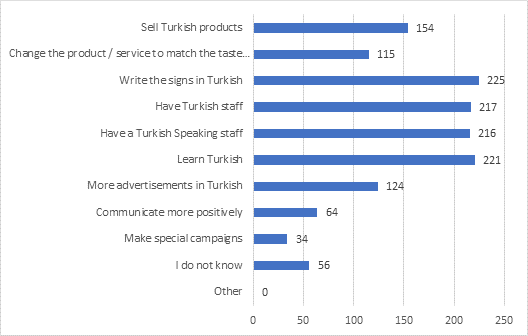
Q08. Safety and stability
Q08-01. Do you think Syrians cause trouble and threaten the safety of Turkey? (N=529)
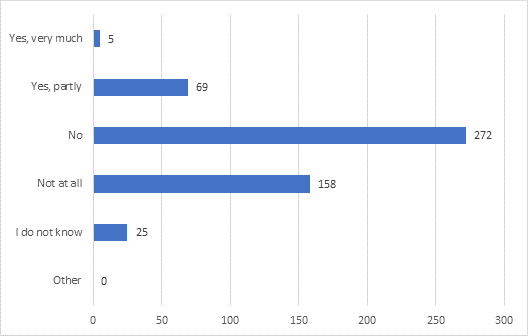
Q08-02. Do you have any fears of being deported from Turkey? (N=529)
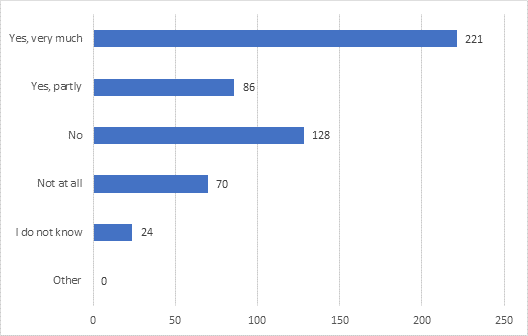
Q08-03. Do you feel safe when you walk at evening in the streets? (N=529)
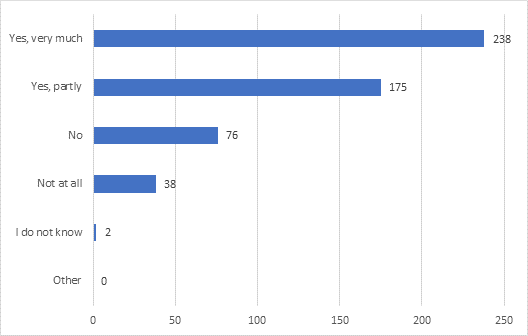
Q09. Citizenship and rights
Q09-01. Do you think you have equal rights as Turkish citizens? (N=529)
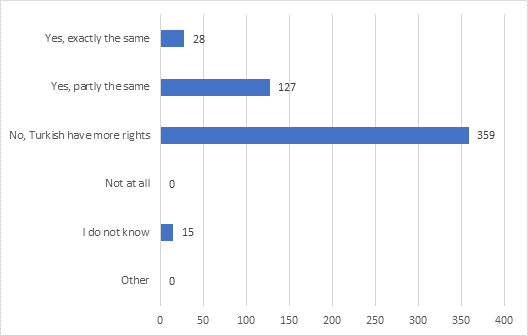
Q09-02. Do you think you have equal rights as other foreigners living in Turkey? (N=529)
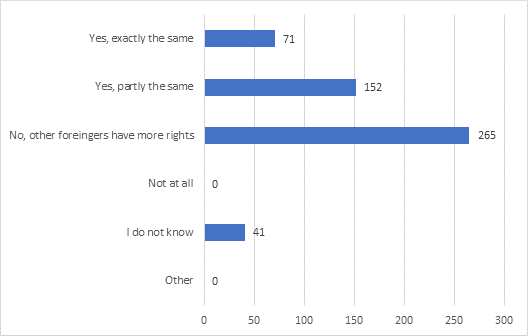
Q10. Future plans
Q10-01. Which one of the following would you prefer? (N=529)
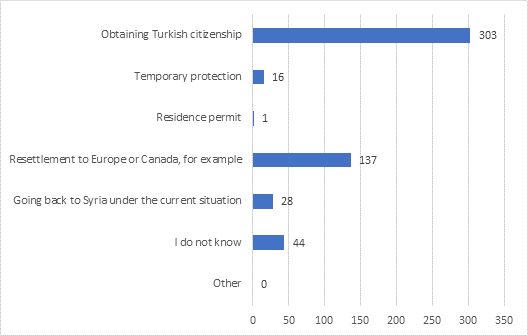
Q10-01-01. If “Obtaining Turkish citizenship” in Q10-01, why? (multiselect) (N=303)
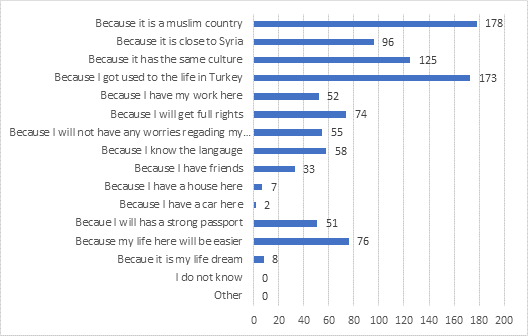
Q10-01-02. If “Obtaining Turkish citizenship” in Q10-01, why do you not want to move to Europe? (multiselect) (N=303)

Q10-01-03. If “Resettlement to Europe or Canada, for example” in Q10-01, why? (multiselect) (N=137)
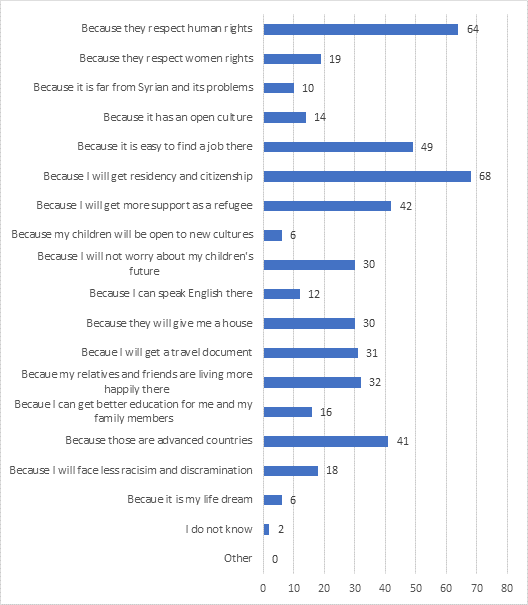
Q10-01-04. If “Resettlement to Europe or Canada for example” in Q10-01, which of the followings do you worry about? (multiselect) (N=137)
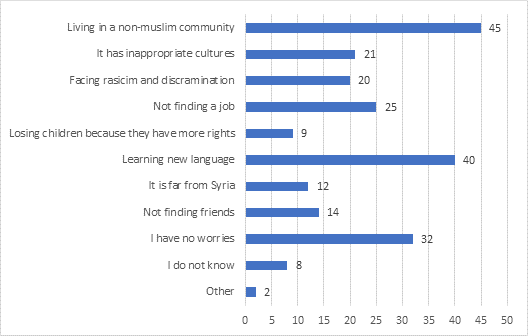
Q10-02. What is your plan for the future if the political situation in Syria changes? (N=529)
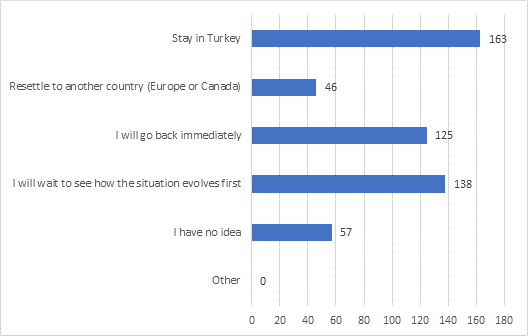
Q11. The use of terms and identity
Q11-01. Do you try to hide that you are Syrian when dealing with Turkish community? (N=529)
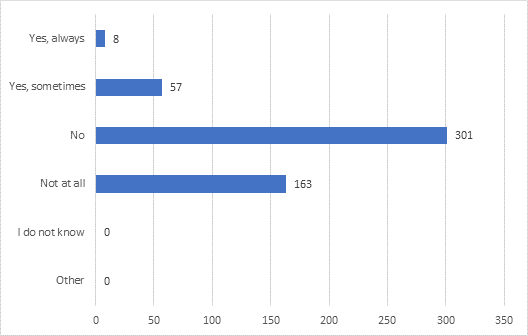
Q11-02. Which one of the following identities do you feel proud of and do not hide when dealing with the Turkish community? (multiselect) (N=529)
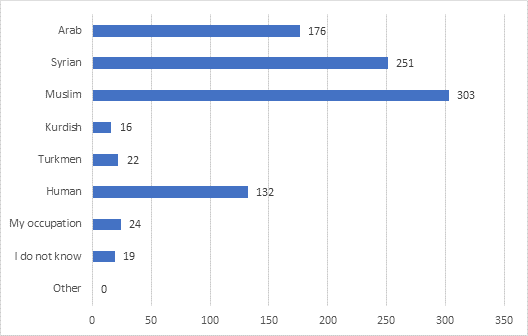
Q11-03. What brings you together with Turkish community? (multiselect) (N=529)
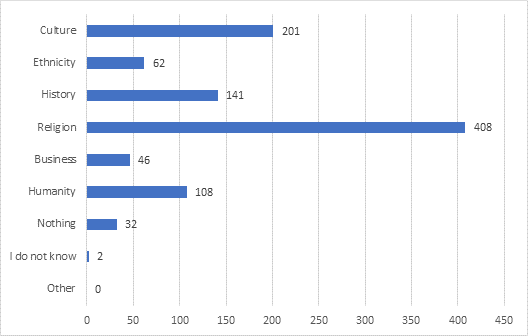
Q11-04. To what extent sharing the same religion with the Turkish community is important for you to live with them in harmony? (N=529)
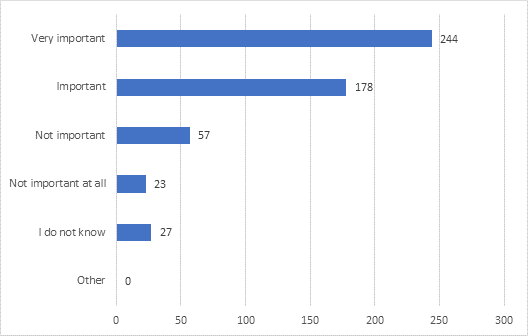
Q11-05. What do you think about Turkish community’s religious practices? (N=529)
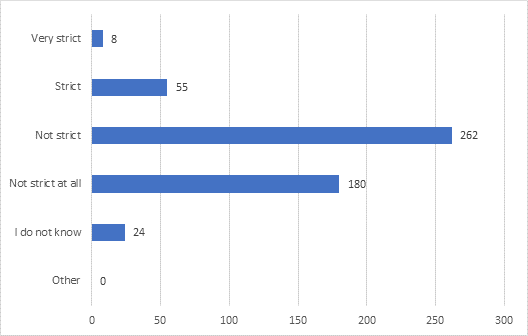
Q11-06. Would the Turkish community show the same hospitality to Syrians if they were Christians or Jews? (N=529)
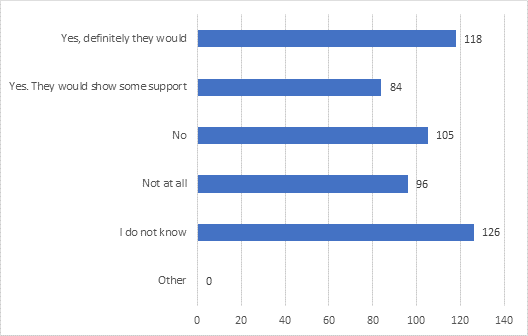
Q11-07. For you personally, what image comes to your mind when you hear the word refugee? (multiselect) (N=529)
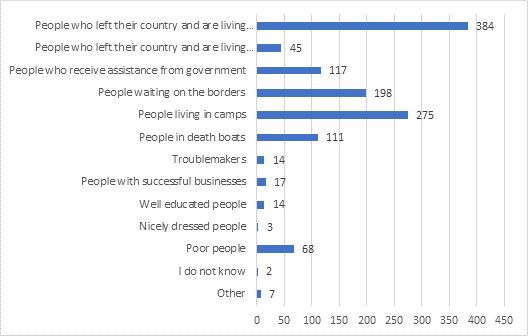
As a definition, according to Geneva Refugee Convention 1951, the term refugee is used to describe the people who left their home countries because of a well-founded fear of being persecuted for reasons of race, religion, nationality, or membership of a particular social group or political opinion, is outside the country of his nationality” and they benefit from various services and rights.
Q11-08. Do you think you are a refugee in Turkey (according to the previous definition; the reason for moving to Turkey)? (N=529)
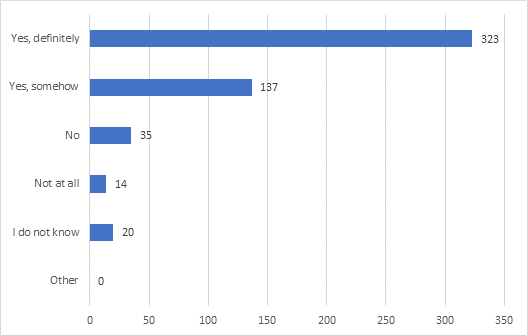
In practice, the word refugee is stereotyped and used to show that a group of people are in need, they are the source of the problems, depend on assistance for living, and they are not productive in the host community.
Q11-09. Do you think you are a refugee in Turkey following the previous explanation (according to the previous definition, as a living condition; they are a burden and live on humanitarian assistance only)? (N=529)
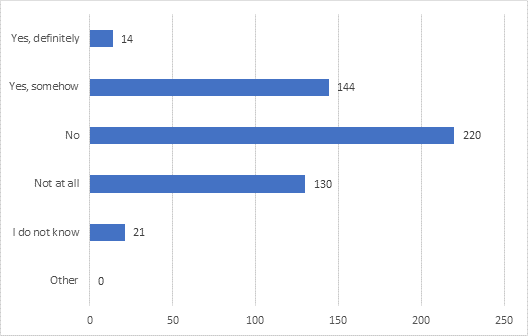
Q11-10. Do you feel agitated when Turkish people call you a refugee? (N=529)
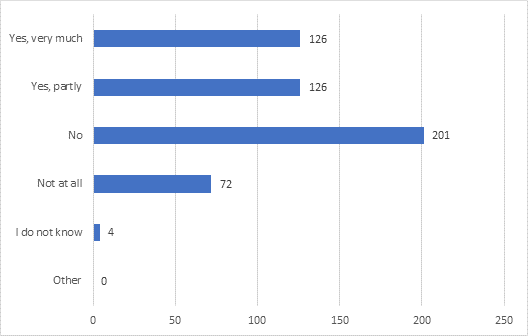
Q11-11. Do you feel agitated when Syrians living in Turkey call you (or themselves) refugees? (N=529)
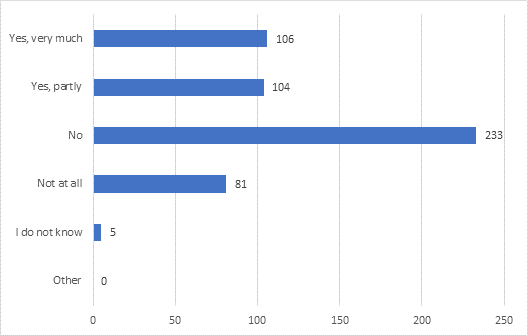
Q11-12. Do you accept that organizations / governments / people call you refugee and collect money on your behalf? (N=529)
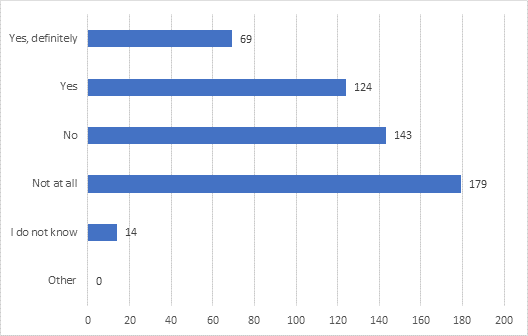
Q11-13. If we were to replace the word “refugee” with another, which one of the following would represent you better? (multiselect) (N=529)
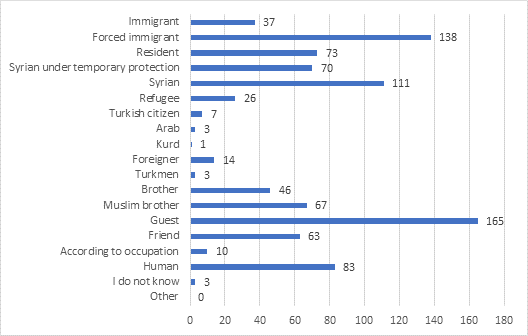
Q11-14. If not Turkey, in your opinion, which countries should be responsible for the Syrians? (multiselect) (N=529)
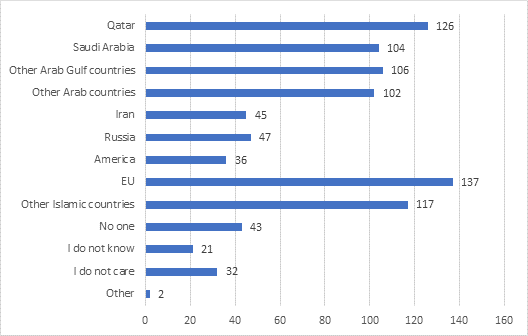
Q11-15. Which sources do you get the news about the situation of Syrians in Turkey from? (multiselect) (N=529)
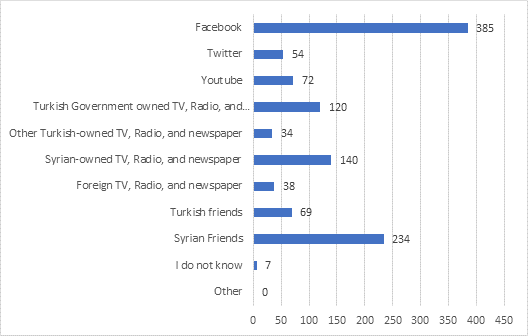
Acknowledgement
The research team would like to thank Mehmet Çiçekli for his valuable support in the project.
